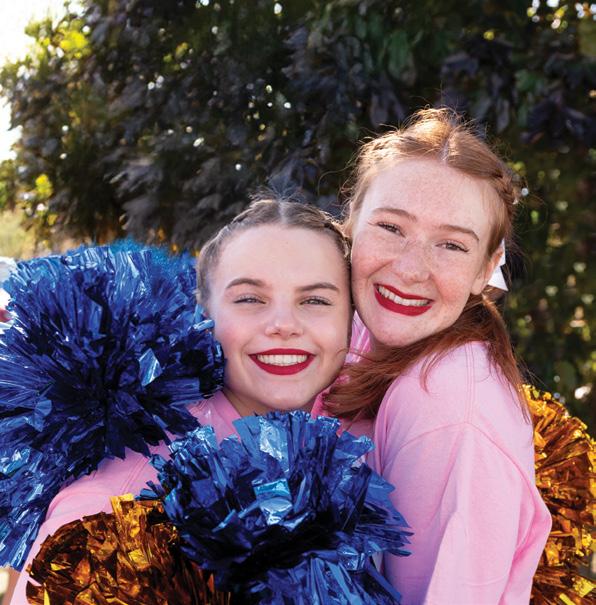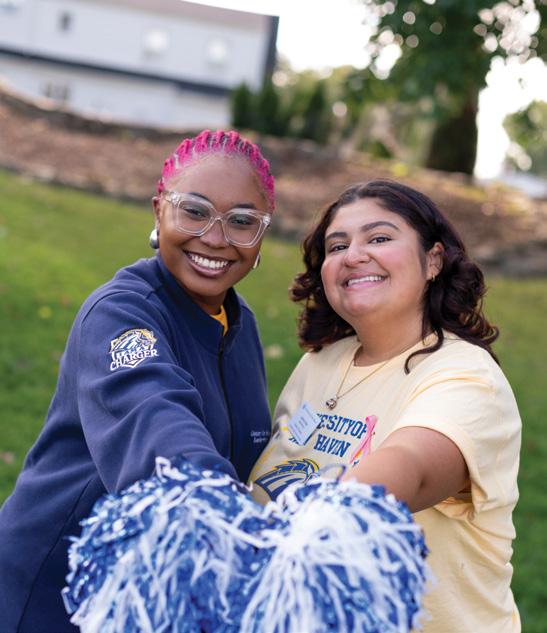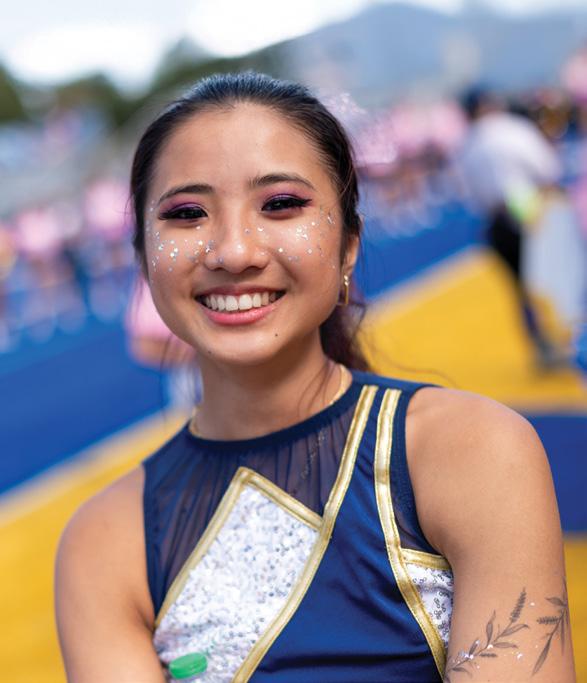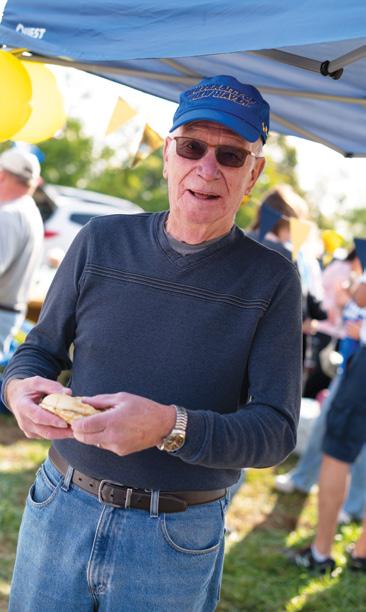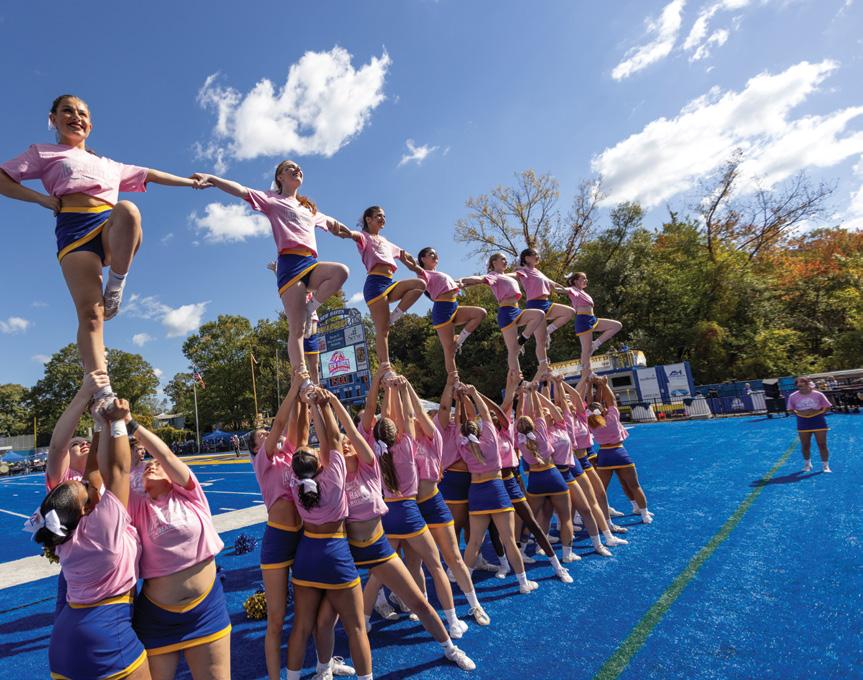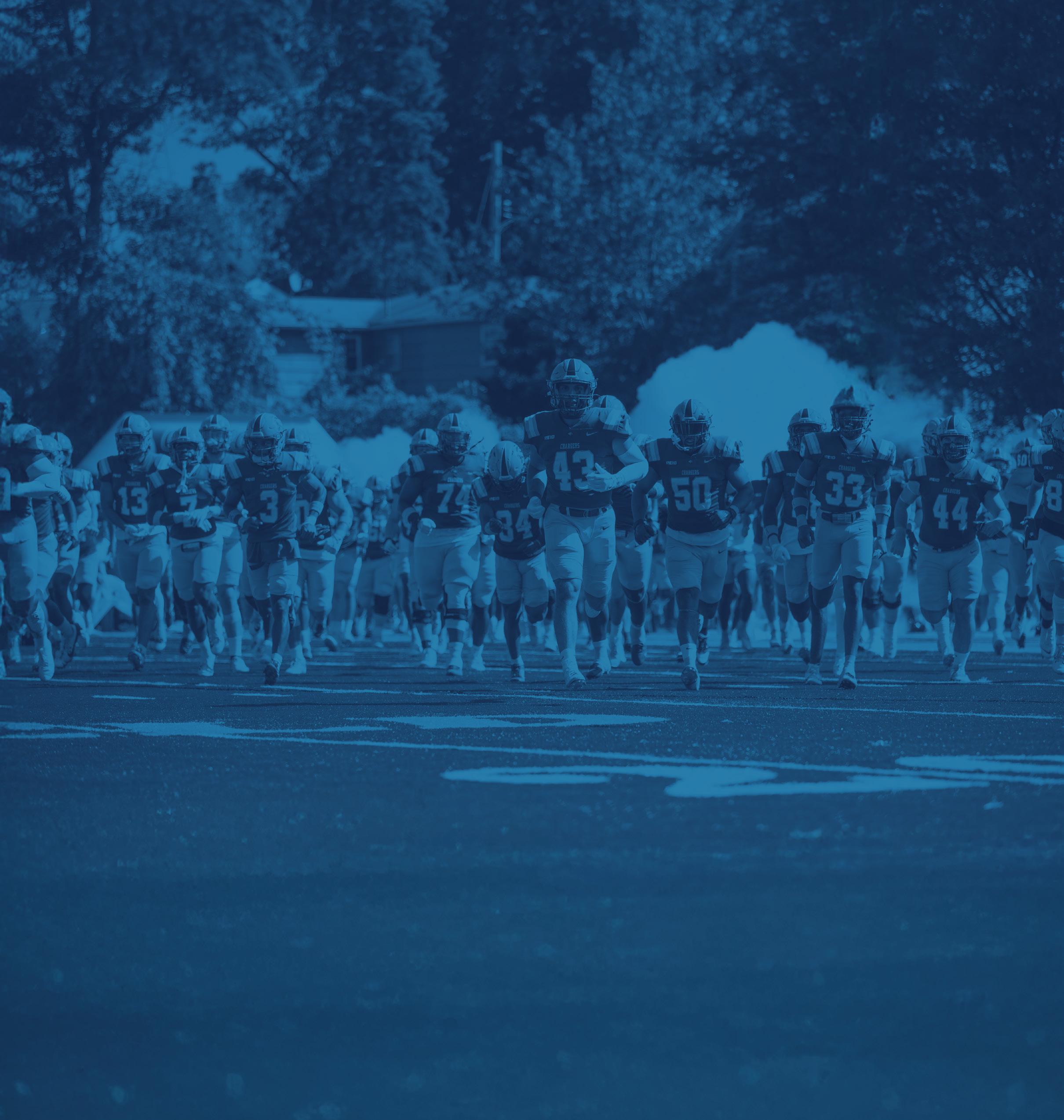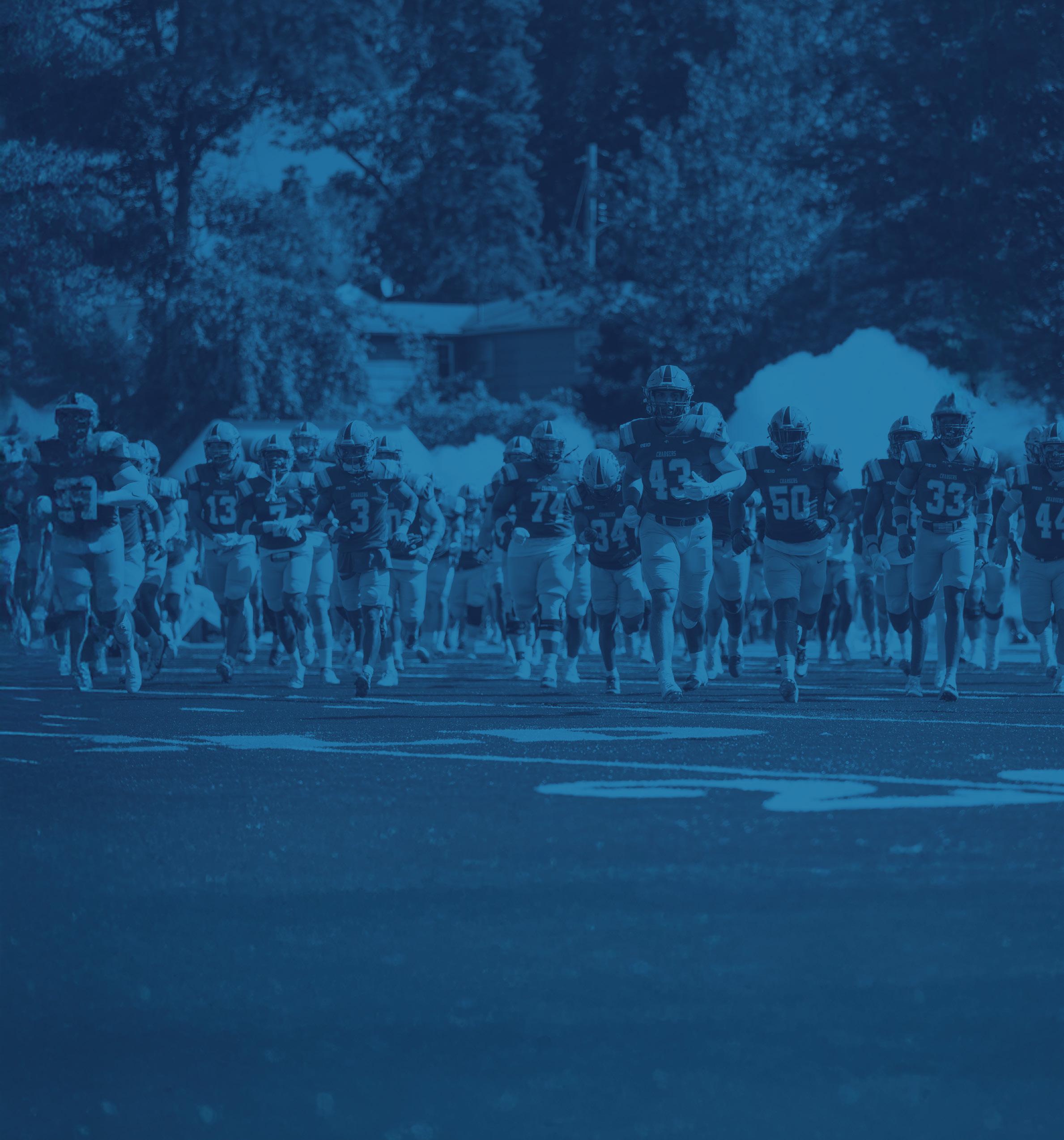The Global Issue
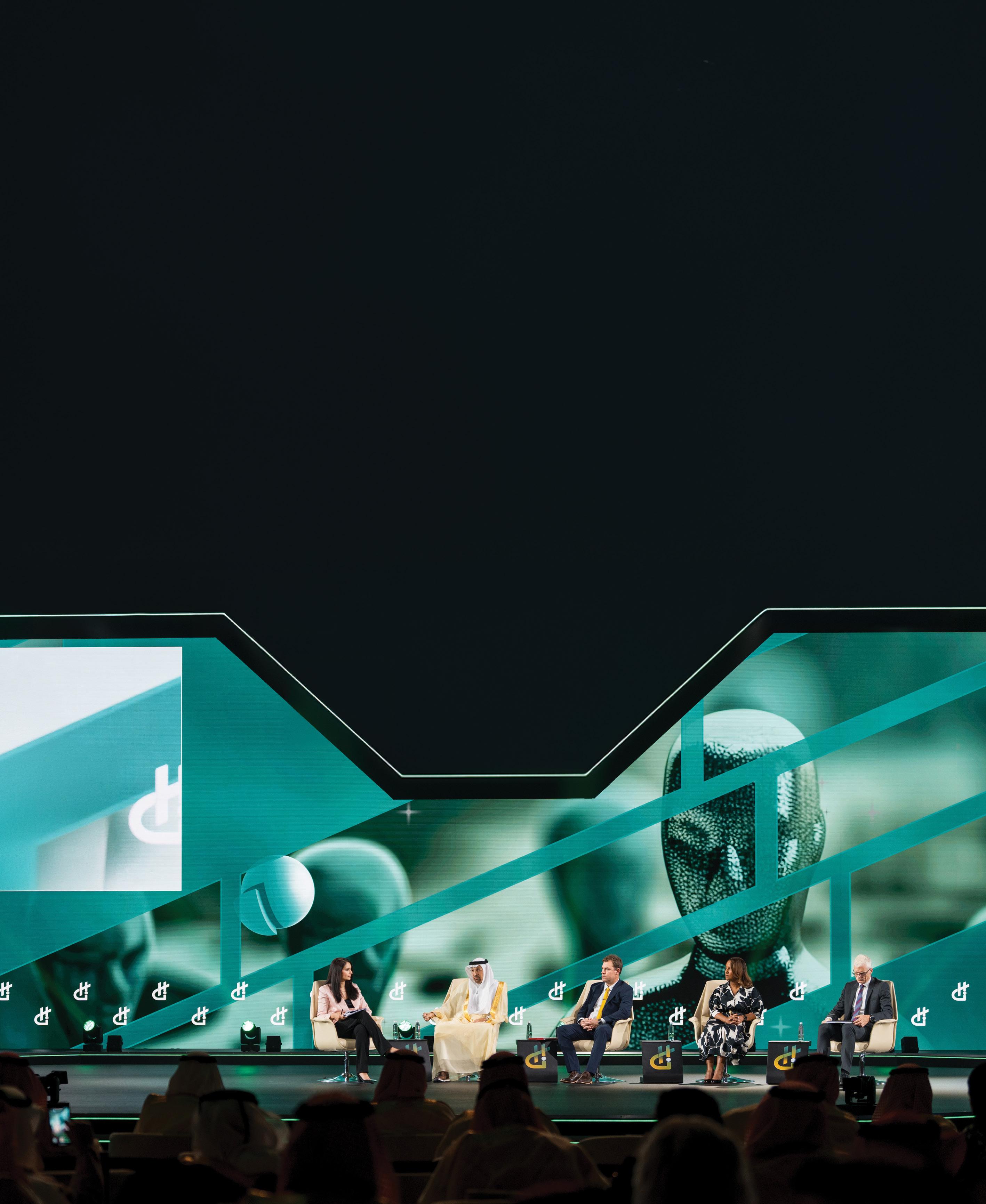
MAN
A
I N T
President Jens Frederiksen Accelerates the University’s Focus on a Shrinking World • Page 10
D A TE FOR
I O N
O N

The Global Issue

MAN
I N T
President Jens Frederiksen Accelerates the University’s Focus on a Shrinking World • Page 10
I O N
O N
The University of New Haven has a longstanding legacy of offering international programming and currently educates students from more than 70 countries. The far- and wide-ranging contributions of the University have consistently reflected a deep understanding of and devotion to a better, brighter future. This transcendent theme of providing opportunities remains a key part of the can-do spirit of the University and a vital priority going forward as the institution continues to grow its international community and cultivate the elite global workforce of tomorrow.


A Mandate for Internationalization
President Jens Frederiksen accelerates the University’s focus on a shrinking world.

From Around the World to West Haven
At U New Haven, we are proud to bring together a rich tapestry of global cultures, supporting international students to plant new roots while nurturing their
Members of Charger Nation are active participants in working to address complex problems with an eye toward solutions and a brighter future for all.
26 • Daniah Miller ’15 Courageous Curiosity
28 • Aemin Becker ’18 Globally Minded
30 Patryk Jaroszkiewicz ’16, ’20 M.S. Honoring His Roots
32 Alexis Fernandez ’26 A Cosmopolitan Engineer
34 • Maeve Moore ’21 Meaningful Connections
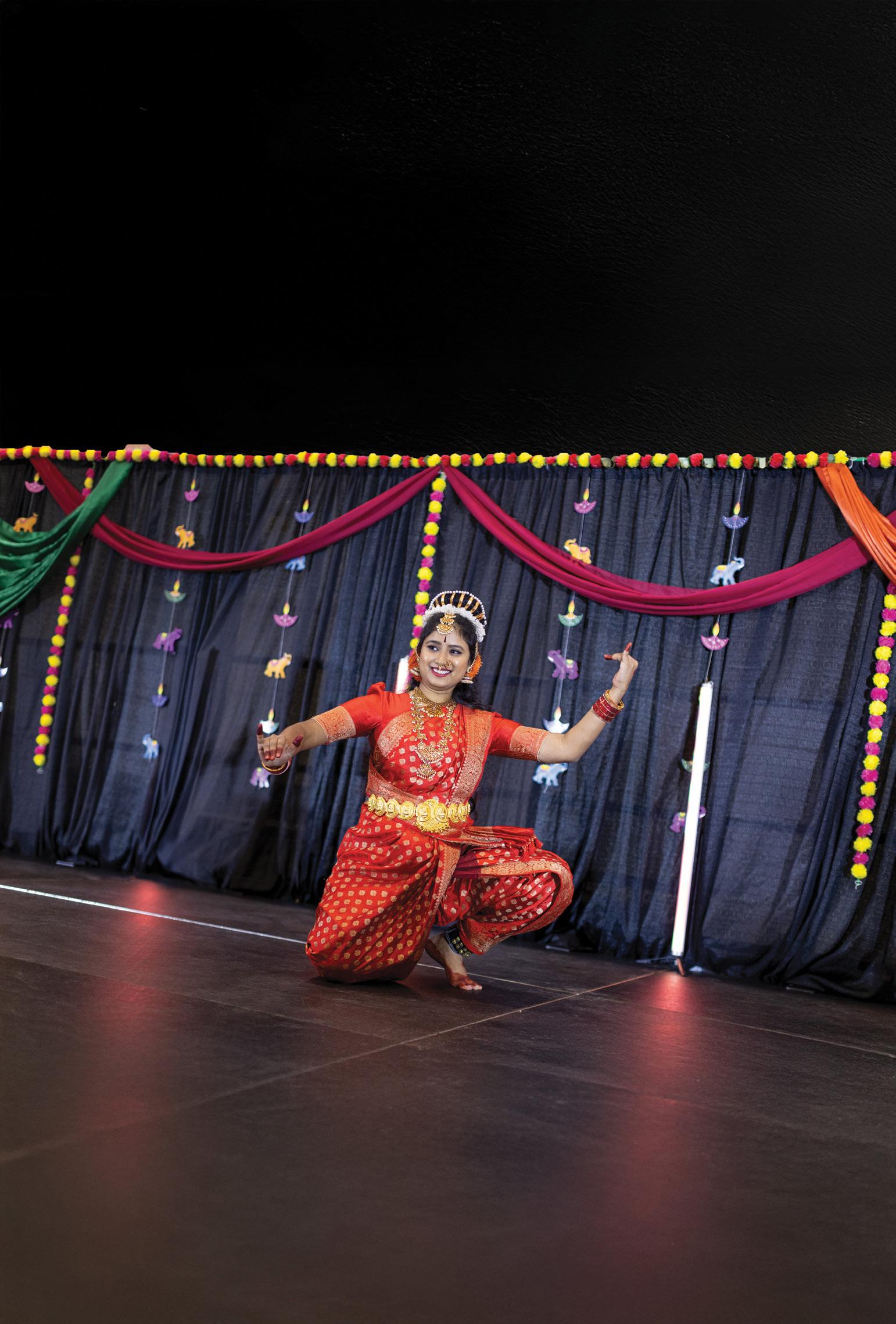
36 • Armani Miller-Jackson ’16, ’17 MBA Education as Opportunity PERSPECTIVE
48 • Wish You Were Here
University of New Haven Settlement If you were a UNH student enrolled in any UNH course as of March 24, 2020 (other than a non-matriculated high school student) and you did not opt out of the Settlement of Krystian Wnorowski, on behalf of himself and others similarly situated v. University of New Haven, Case No. 3:20-cv-1589 (D. Conn.), you will receive the one-time $200 Non-Cash Tuition Credit described in the Settlement if you enroll or have enrolled in a UNH course commencing in September 2023 or later. Go to www.unewhavensettlement.com for more information.
ALUMNI MAGAZINE ISSUE 13 SUMMER 2025
Editor In Chief
Elizabeth Rodgers
Vice President for University Advancement
Brian Otis
Senior Executive Director of Marketing and Communications
Sue Pranulis
President of the Alumni Board of Directors Reece Gleadle ’14
Marketing & Communications
Roger Castonguay, Dave Cranshaw, Tyler Hanson, Rachel Lloyd, Matthew McCullough, Carolyn Meyer, John Mordecai, Laura Norris, Kristen Ortega, Kaitlyn Pinheiro, Carol Regan, Chris Teodosio, Caitlin Truesdale
Design Bria Mangione, Bria Loves Design LLC
Contributors
Jackie Hennessey, Steve Neumann, Julia Tolstrup, Courtney Westlake, Doug Whiting
Photography
Abraham Jedidiah Kalapala, Defining Studios & Defining Properties, Don Hamerman, Herbert Amo Rockson, Len Rubenstein, Mahek Bhagchandani, Saudi-U.S. Investment Forum 2025, University of New Haven Athletics
The University of New Haven Alumni Magazine is published twice a year by the Office of Marketing & Communications. Its mission is to connect alumni and other members of the University community to the University and to one another.
Reach us at: The University of New Haven, 300 Boston Post Road, West Haven, CT 06516 or at magazine@newhaven.edu.
The University of New Haven is committed to equal access to educational and employment opportunities for all applicants, regardless of gender, sexual orientation, race, color, personal appearance, marital status, civil union status, national origin, ancestry, religion, age, or physical or intellectual disability.
©2025 University of New Haven. All Rights Reserved. For permissions, please contact erodgers@newhaven.edu
Growing up, my family would travel each June to a sleepy peninsula in MidCoast Maine to witness one of the region’s best kept secrets — lupine season. Vibrant pink, purple, and white blooms transform the landscape, thriving not in carefully curated residential gardens, but in the dry, sandy soil of roadsides, open fields, and coastal border areas. The idea that these showy stalks so enthusiastically defy the odds always appealed to me and still does to this day.
This wildflower takeover is partly attributed to Hilda Edwards Hamlin, who first arrived in the area from Bristol in the early 1900s. Hamlin, dubbed “the Lupine Lady” by locals, was never without a pocketful of lupine seeds imported from her native England. She would scatter the seeds throughout town on her walks and out the window on drives with friends. The wind took care of the rest.
possibly multiply the beauty she encountered during her travels? And (you guessed it) she finds the answer in the blue, purple, and rosecolored flowers growing in between the rocks surrounding her seaside cottage.
The story concludes with Alice sitting with her great-niece, storytelling and sharing a familiar piece of advice: “You must do something to make the world more beautiful.”
On the surface, this is a simple and straightforward story about wildflowers.
What kind of world do we want to build for those coming up? How can we each take part in leaving our planet better than how we found it? What seeds can we plant today as a first step?
In truth, the tale of the Lupine Lady taps into a rushing undercurrent of salient musings on what it means to be a responsible global citizen: the importance of intentionally exposing yourself to different cultures, of cultivating discernment for what is most meaningful in life, of aligning your purpose with these intrinsic values, and of the ways we can each wield our unique gifts to better the world.
Children’s author Barbara Cooney wrote the book “Miss Rumphius” about a fictional character, Alice, loosely based on Hamlin.
As a child, Alice pronounces to her grandfather — an immigrant who came to America “on a large sailing ship” and worked as a wood carver and artist — that she too will one day travel to faraway places and live by the sea. He adds a third item to this checklist. “You must [also] do something to make the world more beautiful,” he says.
As an adult, Alice delivers on her promise to see the world and returns home to settle along the coast. There, she tackles her most difficult promise — to make the world more beautiful. How, Alice wonders, can she
This issue of the University of New Haven Alumni Magazine guides us to reflect on these same themes. To see the interconnectedness in all things and recognize that small acts today can have ripple effects for future generations; to acknowledge that children and young adults watch the way in which we move through the world; and to see opportunity, not a burden, in this ability to inspire others.
My hope is that this issue sparks something within each reader and that we take up the collective challenge to press pause and ask ourselves some important questions. What kind of world do we want to build for those coming up? How can we each take part in leaving our planet better than how we found it? What seeds can we plant today as a first step?

Editor In Chief
The University of New Haven has received a $10 million gift from a 1981 graduate that will serve as the leadership donation to create a new on-campus building for the Pompea College of Business.


The gift was made by Dennis Martin ’81, chairman of the board of Federal Signal Corporation, a manufacturer of public safety, security, and emergency systems and equipment. Martin achieved great success as a business executive, helping to turn around struggling companies. He described the development of the new building and its vision as a “game changer.”
Reflecting the University’s commitment to maximizing students’ return on investment, the 80,000-square-foot facility will prominently feature suites dedicated to career development, mentorship, recruiting, and advising. The space will also feature a simulated financial trading room, a business analytics/
AI lab, a learning lab for student research, and a student-run cafe operated by hospitality and tourism management students, as well as state-of-theart classrooms, faculty offices, a theater-style lecture hall, and an executive seminar room. In addition, the building will include casual spaces throughout that foster collaboration and teamwork, promoting the principles that are essential for a successful college of business.
The new building enables the University to transition its Pompea College of Business back to its main campus in West Haven from its campus in nearby Orange, which was once home to the worldwide headquarters of Hubbell Electronics.
Martin, who enrolled at the University in the late 1970s, was drawn to its focus on hands-on learning. He already had a full-time job, a wife, three children, and two years of college under his belt, along with a desire to complete his bachelor’s degree. He went on to hold leadership roles as Ingersoll-Rand and Illinois Toolworks, where he rose to become president of one of its $1 billion divisions. He was recruited to lead the successful turnaround of the General Binding Corporation. After leading a consulting practice, he joined Federal Signal and served as president and CEO for five years, before transitioning to a leadership role on its board.
Martin who previously donated to the University’s makerspace, providing support for new equipment, earned a B.S. in industrial engineering and management from the University of New Haven in 1981 and was conferred an honorary doctorate in 2005. He lives in Florida with his wife, Barbara.

130,000 sq. ft. of space dedicated to research, workforce training, and industry collaboration.
130,000 sq. ft. of and industry
The University of New Haven has acquired the Railroad Salvage property in West Haven. The acquisition includes the existing 130,000-squarefoot building as well as the surrounding 12-acre lot located directly across from the university’s main campus.
To prepare the next generation of an elite global workforce and to ensure that students are careerready across every sector of industry, the University has launched numerous initiatives, including a preferred corporate partnership program and a requirement that all incoming students upload their resumes to a robust career management platform.
According to University leadership, this is part of the value proposition of an ever-evolving higher education sector, and, by extension, an institutional mandate to deliver a return on investment for University of New Haven students. The University has an outstanding tradition of promoting curricula and an overall experience that is deeply market-responsive, with an emphasis on experiential learning and continuing education.
In this spirit of bridging the divide between higher education and industry, the University intends to use the Railroad Salvage property to establish a pioneering research and development center that
focuses on the state of Connecticut’s advanced manufacturing industries and the key intersection of university research, innovation, and workforce development.
Specifically, the Research and Development Center will look to stimulate the regional economy by delivering research products in emerging advanced manufacturing areas and providing workforce training to address the demand for skilled professionals in the field and an increasingly dynamic global labor force.
In addition to additive manufacturing, the emerging elements of advanced manufacturing embodied in Industry 4.0 — artificial intelligence (AI) and cybersecurity — will contribute to the pervasive needs of supply chain resiliency and Smart Industry Readiness.
The new Research and Development Center will align strategically with Connecticut’s need to support defense, biomedical, and other industries, strengthening the State’s objectives to maintain and grow its leadership role in these domains. It will bring together stakeholders in academia, government, and industry. Leveraging the expertise, diverse perspectives, and multidisciplinary talents of faculty, students, CEOs, managers, and technicians from small and medium-sized enterprises (SMEs) will permit cutting-edge research and practical realworld challenges to be simultaneously addressed.

The University of New Haven helped bring together a statewide collection of universities, leading corporations, and public sector partners to help launch the Connecticut AI Alliance (CAIA).
The founders included Vahid Behzadan, Ph.D., assistant professor of computer science and data science and director of the University of New Haven’s Secure and Assured Intelligent Learning (SAIL) lab; Ron Harichandran, dean of the Tagliatela College of Engineering and vice provost for research at the University; and Jen Widness, president of the Connecticut Conference of Independent Colleges.
The groundbreaking consortium seeks to advance the development, application, and impact of artificial intelligence across Connecticut. Founded to foster AI-focused business development, workforce training, policy engagement, and community access, CAIA is poised to position Connecticut as a premier hub for AI innovation.
The University of New Haven and Hartford HealthCare (HCC) announced a groundbreaking new partnership in which Connecticut’s largest healthcare network will operate the University’s on-campus student health center.
In addition to managing the student health center, Hartford HealthCare will oversee the university’s counseling and psychological services. The collaboration will also extend to athletic training, providing specialized sports medicine and rehabilitation care for the university’s student-athletes.
A key feature of this partnership will enhance oncampus services that will offer virtual care options. This marks Hartford HealthCare’s first collaboration with a university utilizing this advanced technology, setting a new standard for student healthcare.


University of New Haven and Connecticut State Community College (CT State) leaders have signed a partnership that will offer guaranteed admissions and merit-based scholarships to graduates of CT State Community College who meet certain academic requirements.
Graduates of CT State who earn a minimum cumulative GPA of 2.5 will be guaranteed entry into U New Haven’s transfer program and a transfer of up to 90 credits. Merit-based transfer scholarships will be provided, up to $30,000 annually.
The University is one of just more than 200 colleges and universities in the country, and the only one in Connecticut to earn a spot on Phi Theta Kappa’s 2024 Transfer Honor Roll, which recognizes institutions for creating pathways that lead to success for community college transfer students.
$100 internship bonus begins Summer 2025


The University has launched a donor-supported Internship Signing Bonus program that, beginning Summer 2025, will provide a $100 reward to all undergraduates who complete a qualified internship. This initiative supports the University's focus on career development as well as maximizing graduates' outcomes and the return on investment of earning a college degree.
700 undergraduate students completed internships during the 2024 calendar year, and there was a significant increase in experiential and professional learning opportunities during the Fall of 2024.
The bonus will be paid to students at the end of their internship experience and when all required documentation and coursework has been finalized. Each year, students who successfully completed an internship the previous academic year will be celebrated at an Internship Signing Bonus Day event.

The University’s Pompea College of Business has created a partnership with the New York Mets of Major League Baseball to become the franchise’s first higher education partner.
Students will be able to take part in site visits and mentorship sessions with employees of the Mets, who will also participate in course collaborations through the Sport, Tourism, and Hospitality Management department. In addition, the University name and brand will be showcased in digital content created by the Mets.
The Pompea College of Business, which is accredited by AACSB, offers bachelor’s and master’s degrees in sport management. The graduate program, featuring concentrations in business analytics and college athletic administration, has been ranked by SportBusiness as the best in the world for graduate outcomes.
Three University faculty members — David Myers, Ph.D.; Kevin Barnes-Ceeney, Ph.D.; and Maria Tcherni-Buzzeo, Ph.D. — have been awarded a highly competitive National Institute of Justice (NIJ) grant to conduct a five-year evaluation of CommunityBased Violence Intervention and Prevention Initiatives (CVIPI) in New Haven.
Their work will build on ongoing initiatives being led by the city and provide critical insights into the effectiveness of community-led violence reduction
strategies. The project is a natural extension of the work Dr. Barnes-Ceeney has been conducting under a previous Bureau of Justice Assistance (BJA) grant.
The NIJ grant also creates invaluable learning opportunities for University students. Several students pursuing their Ph.D. in criminal justice will be involved in the project, gaining hands-on experience in conducting large-scale, real-world research.



Professor Recognized for Work on Behalf of LGBTQ+ Community
Michael Lawlor, J.D., associate professor of criminal justice and acting associate dean of the Henry C. Lee College of Criminal Justice and Forensic Sciences, was honored by Lambda Legal, a national organization committed to achieving full recognition of the rights of LGBTQ+ individuals, for his work as attorney, legislator, policy maker, and educator.
A Connecticut congressional representative for 24 years, and former Connecticut Governor Dannel P. Malloy’s undersecretary for criminal justice policy and planning, Lawlor championed civil rights on behalf of the LGBTQ+ community.
Lambda Legal honored Prof. Lawlor at its annual Connecticut Cares event. U.S. Senator Richard Blumenthal, Connecticut Attorney General William Tong, and other luminaries attended.

Introducing the Qiu Feili Exchange Initiative
Friend of the University Philip Qiu is a successful real estate developer in China and founder of the Chinese American Museum in Washington, D.C., who directs his philanthropy toward poverty alleviation, programs for special needs children, and raising awareness of Chinese culture abroad.
Philip and his wife, Joanna, recently established The Qiu Feili Exchange Initiative for Collaboration, Learning, and Cultural Inclusion at the University of New Haven, which includes scholarship support and a Chinese American exchange program to assist with international recruitment efforts.
The University of New Haven hosted three Commencement ceremonies on Friday and Saturday, May 16–17, to award more than 3,300 degrees to its Class of 2025.
A highlight of the celebration was the undergraduate Commencement address delivered by world-renowned forensic scientist Dr. Henry C. Lee, founder of the University’s Henry C. Lee Institute of Forensic Science, who this year celebrated his 50th anniversary as a member of the University community. An honorary Doctor of Humane Letters degree was awarded to Dr. Lee’s wife, Xiaping Jiang Lee, a distinguished author, screenwriter, and educator.
Doug the Pug, the viral pet celebrity with more than 18 million social media followers, was also recognized at the undergraduate ceremony as an honorary member of the Class of 2025.
Angela Mercaldi ’25, a mechanical engineering major and member of the Chargers Women’s Track and Field team, was selected through a competitive process to address her classmates. Additional remarks were offered by President Jens Frederiksen — presiding over his second Commencement celebration since becoming the University’s seventh president last March — and Connecticut U.S. Senator Richard Blumenthal ’00 Hon.





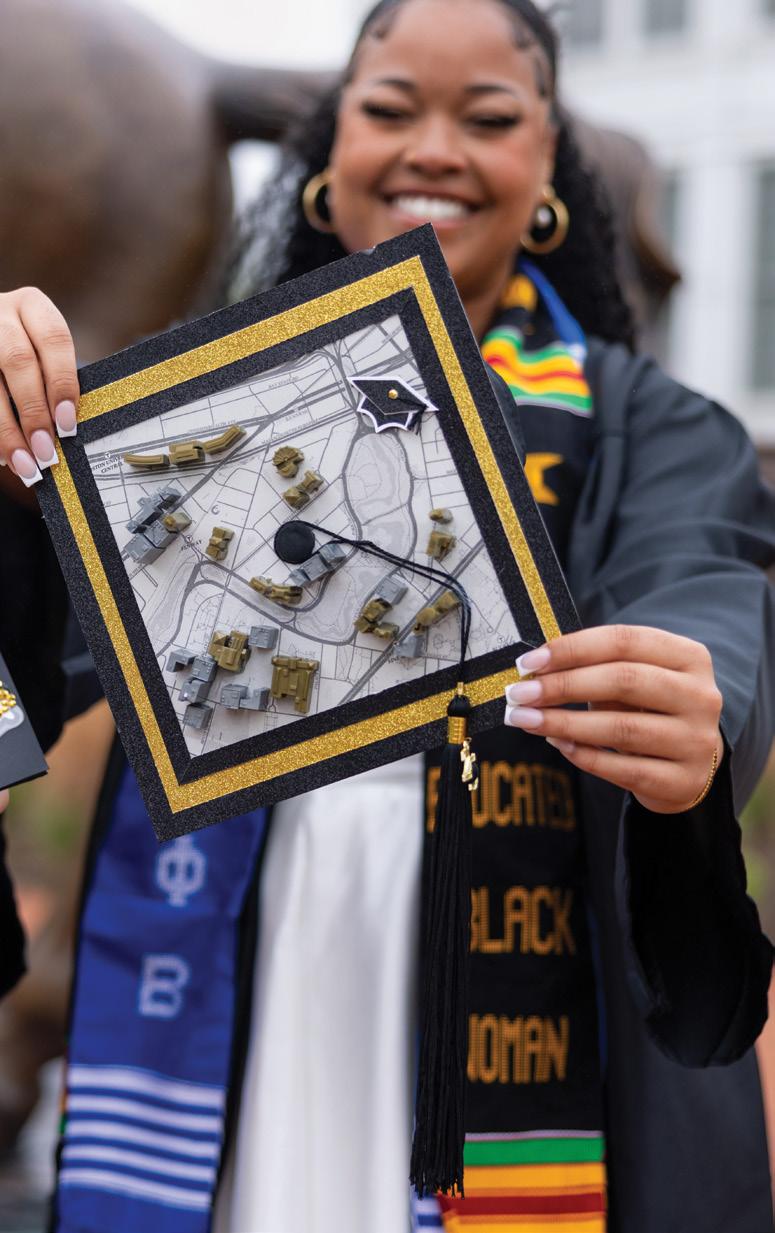


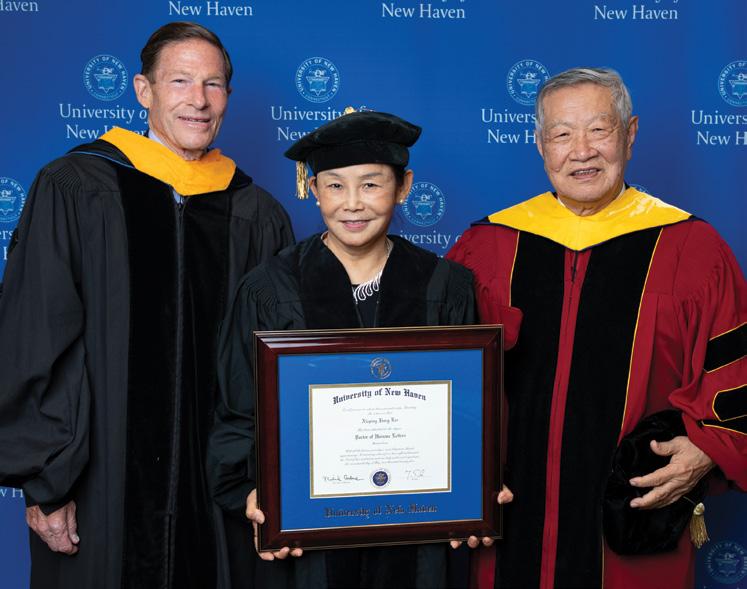


BY DOUG WHITING
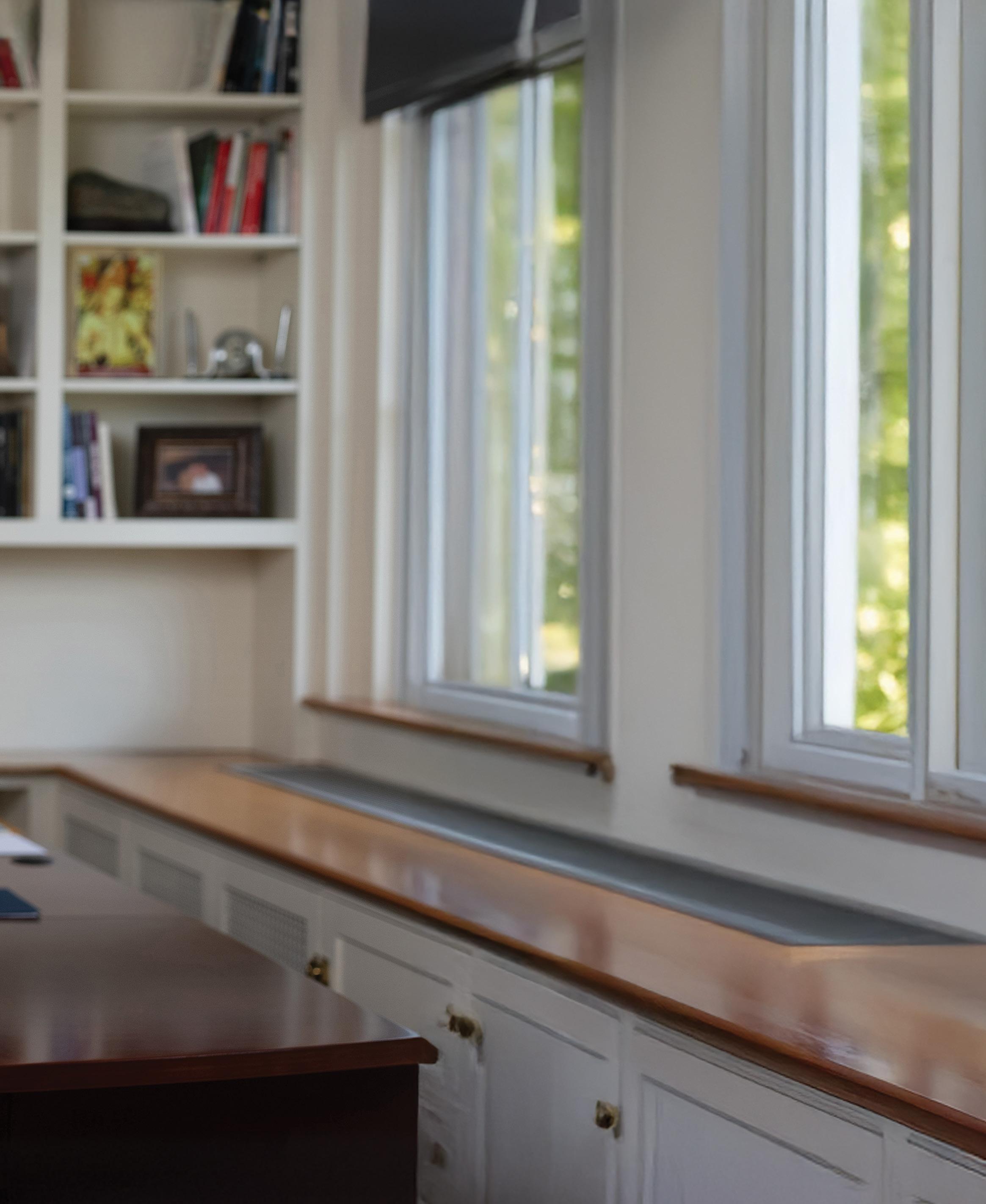
Ageneration ago, the political commentator and author Thomas Friedman argued in his groundbreaking book “The World is Flat” that the speed and ferocity of technological change happening across the globe were leveling economic disparities and creating a “flatter” economic playing field.
Although more than a few economists argued that Friedman’s predicted economic leveling would not come to pass, there is no disputing that the pace of technological change has only accelerated in the past two decades, notably with advances in the world of artificial intelligence (AI). And it seems that Friedman’s notion of a shrinking, if not flatter, planet has ushered in a time when the acquisition of global perspectives and experiences by today’s college students — and tomorrow’s elite global workforce — is no longer optional.

Responding to that mandate, the University of New Haven has determined that a global focus is of strategic significance to the University’s future. “The tide of globalization is only going to advance in the years ahead,” says University President Jens Frederiksen, Ph.D. To underscore the University’s positioning, this year Frederiksen established a division of government affairs and global engagement and determined that U New Haven’s global focus would be built upon four pillars: student enrollment pipelines and exchanges; academic and industry partnerships; the expansion of bespoke contracting work for public and private organizations and institutions; and the unique opportunity of establishing a branch campus in Riyadh, Saudi Arabia (see page 16).
“We can learn a lot from differences,” Frederiksen maintains, “but we haven’t done enough as an institution to articulate how we have integrated globalization into our community as an incredible value-add to the student experience and a real enhancement to the return on their investment in us.” Frederiksen continues, “Some of this happens in the

The Tide of Globalization
President Frederiksen has established a division of government affairs and global engagement and determined that the University of New Haven’s global focus will be built upon four pillars:
1 Student enrollment pipelines and exchanges
2 Academic and industry partnerships
3
4
The expansion of bespoke contracting work for public and private organizations and institutions
The unique opportunity of establishing a branch campus in Riyadh, Saudi Arabia
classroom, some of it outside of the classroom. We need to help our students understand that preparing them to live in an increasingly transformative world, where the pace of change is discombobulating, is essential. There needs to be an immersive quality to what we offer as we prepare our students to be competitive for higher-paying careers.”
Understanding that some jobs today will become obsolete in the years ahead, Frederiksen says that students need to develop flexible skill sets, prepare for multiple careers, and be demand driven from an economic standpoint while having the ability to wrestle with questions of taste, aesthetics, awareness, and resiliency that AI, at least today, cannot address.
“Internationalization is baked into our DNA,” he says, “but now we’re really leaning into why we did it and why it’s a part of us. This is our moment to assign some deliberate thought to how we tell this part of our origin story as an institution.”
He knows firsthand the value of a global experience that can expand students’ horizons, enlarge their perspectives as agile thinkers and doers, and equip them with a more well-rounded outlook on the world.
Born in Denmark, he moved to Luxembourg at age eight, where he “witnessed a real melting pot and grew up with the idea that people transcend nationality.” He spent time in France and Spain before traveling the globe as a professional tennis player. He eventually landed in the U.S. for collegiate studies at Vanderbilt University. “Maybe these experiences have given me a deep-rooted appreciation of the transcendent themes across cultures and nations,” he says.
Frederiksen says the work ahead at the University is exciting — and necessary. He speaks of infusing a global understanding and perspective in every academic discipline and expanding comparative studies. He firmly believes that as AI and other technological advances continue at warp speed, it behooves the University to prepare students for their roles as the next generation of an elite global workforce in industries from gaming and esports to social planning, healthcare, engineering, and business, all of which are demanding human capital at the highest level.
He says faculty at the University are receptive to his notion of evolving it into a university maintaining its local feel but with a global impact. “We have a global faculty with a can-do legacy around international education. They understand the possible upside and have a high appreciation for the opportunity for growth. Many are involved in existing international partnerships, and we want to encourage them to be more entrepreneurial in developing more.”
As a practical matter, Frederiksen says the focus on international enrollments is to diversify the international student population, which has traditionally and disproportionately relied on graduate students from India, and to grow the University’s international population at the undergraduate level.
“We are proactively focusing on international undergraduate enrollment,” he says, adding that the

Internationalization is baked into our DNA, but now we’re really leaning into why we did it and why it’s a part of us. This is our moment to assign some deliberate thought to how we tell this part of our origin story as an institution.
President Frederiksen
University’s approach to international recruitment is already shifting to realize a goal of doubling the international undergraduate enrollment over the course of the next 18 to 24 months.
With respect to diversification, Frederiksen says, “It is paramount to reverse the trend of relying almost exclusively on graduate students from India, as evidenced by the substantial drop in numbers this past fall. Considering the shorter duration of graduate programs, it creates unsustainable pressure on recruitment and, by extension, on the budget.” He says the University is now proactively mitigating the risk of its absence in non-Indian markets by elevating recruitment, branding, and partnerships in other markets.
The challenges, and the possibilities, of increased internationalization animate Frederiksen. He enthuses about a visit with participants in the University’s recently launched Afghan Women’s Scholarship program (see page 18).
“I had lunch with the current cohort of Afghan women,” he recalls, “and it was impressive to hear of their struggles and hard not to be moved by their experiences.” The experience for Afghan students, he says, “can be life altering in many ways, and their presence on campus will also be significant for our domestic students, who can reflect on what they can do in a meaningful way to pave the way for women from distressed backgrounds. We are gratified to be involved in the kind of work that will allow these women to improve their lives and situations.”
He expresses similar sentiments about an encounter with a Ukrainian student on campus earlier this spring. “Again, I heard firsthand of the struggles she faced and the optimism she expressed about her experience in West Haven.”
The University, he concludes, will continue to expand on its international relationships and “engage the global community with our resources and expertise. In this vein, it is imperative to continue to build relationships that open new markets for recruitment, partnerships, and contracting.”
nges and


BY DOUG WHITING
POSITIONING THE UNIVERSITY OF NEW HAVEN TO LEAD IN AN INTERCONNECTED GLOBAL ENVIRONMENT
One needn’t look too hard at the University of New Haven to gain an appreciation for its historic and continuing commitment to giving students an education infused with an international perspective.
In ways both large and small, one finds examples of what President Jens Frederiksen, Ph.D., calls “a university with a local feel and a global reach.”
That global reach can be found in the University’s award-winning and record-setting Model United Nations program, with its growing portfolio of Outstanding Delegate awards; in the hundreds of students who have studied abroad at the University’s nearly 15-year-old campus in Prato, Italy; and in the depth and breadth of internationally related academic course offerings across all of the University’s schools and colleges.
It presents itself in an international conference hosted with Yale University in July 2024, examining the complex geopolitical past and present of the Baltic region and drawing participants from countries around the world.
The University’s reach can also be seen in the work of adjunct professor of national security Olena Lennon, Ph.D., who served as one of a handful of Americans to participate in the Organization for Security and Cooperation in Europe’s election observation mission in Moldova in October 2024.
Also, the University’s Lee College hosted a delegation from the University of Tirana, Albania, in December 2024 to share ideas that foster innovation and excellence in criminology education and research, solidifying the University’s leadership position in the field. In addition, the Lee College continues an exemplary exchange agreement developed nearly two decades ago with the Polish National Police (PNP), whereby approximately 100 students have participated in a summer study abroad experience in Poland, and members of the PNP come to campus annually for training and cultural immersion. According to Interim Dean David Schroeder, Ph.D., the exchange “provides a deep, rich experience for our students and is designed to create a new way of exposing students to police and police to students.” Dr. Schroeder was the third member of the University’s academic community to receive state recognition from the nation of Poland for this exchange — in this case, the Centenary Medal from the PNP in 2019.
A final example, the University’s participation in The BridgeUSA Ukrainian Academic Fellows Program brought Kateryna Lokes, Ph.D., a visiting scholar and oral and maxillofacial surgeon from Ukraine to West Haven for a six-week fellowship in the 2024 to 2025 academic year to work with students and faculty in the School of Health Sciences.
These are just a handful of the programs and partnerships that are putting University of New Haven students and faculty in positions to succeed and prosper in an increasingly interconnected global environment.
Today, the strategic intentionality of the University’s belief in the power and advantages of internationalization is more prominent, ambitious, and tangible than ever.
As Frederiksen puts it when describing the global nature of a U New Haven experience as a key strategic priority, “The University of New Haven is a private university with a public mission, and that mission is global. It has a long legacy of global engagement — whether in the form of university partnerships, a campus in Prato, student enrollment, exchanges, or bespoke programming for specific agencies and organizations in Europe, the Middle East, and East/ South Asia. Today, the University is home to students from more than 50 countries, and international programs and partnerships continue to expand.”
The following are two examples of how the University of New Haven continues to fully embrace and advance globalization initiatives and how it is making good on its promise of an “intensified focus on preparing the next generation of an elite global workforce,” in Frederiksen’s words.
In a landmark initiative, the University announced this spring that, in a joint effort with the Kingdom of Saudi Arabia, it will establish a branch campus in Riyadh in 2026. The University is the first foreign entity to apply for a higher education license from the Kingdom to open a branch campus in Saudi Arabia.
The Kingdom estimates that there is a shortfall of placements for as many as 200,000 age-eligible Saudi citizens each year, suggesting enormous potential for growth, as well as a great need for access to higher education. The new campus is scheduled to open in the Fall of 2026, and will grow to serve 13,000 students (10,000 undergraduate students and 3,000 graduate students) and support the Kingdom of Saudi Arabia’s Transformative Vision 2030 goals, which provides a blueprint for diversifying Saudi Arabia’s economy, empowering citizens, investing in and increasing private sector participation in higher education, and creating a vibrant environment for both local and international investors.
Frederiksen says the initiative in Saudi Arabia, which, in addition to the branch campus, includes academic partnerships and contracting opportunities, is currently the University’s main international strategic focus.
“The academic partnerships are consistent with other standard partnerships in terms of a revenue sharing program delivery approach,” he says. The University of New Haven is currently talking with several highly ranked universities in the Kingdom about new partnerships across multiple disciplines, and this fall, the University will receive its first students from Prince Sultan University, one of the elite Saudi institutions.
Frederiksen added that various projects are underway with several Saudi ministries, including sports, communications, and tourism, and the University has had discussions with the private American University of Riyadh to serve as the project management lead in supporting the establishment and launch of the Riyadh campus.
“The University of New Haven is proud to have been an active supporter of higher education in Saudi Arabia for over twenty years, both within
the Kingdom and on our Connecticut campus,” says Frederiksen.
He says that the University’s solutions-oriented mindset “fits our vision for the Saudi program, and [the University] is one of only a small number of U.S. universities that have successfully integrated U.S.-style undergraduate degrees with educational offerings in the Kingdom.” Given the University of New Haven’s world-renowned programs in criminal justice, national security, and forensic science, the University was asked by and entered into an agreement with the King Fahd Security College in Riyadh in 2016 to advise it on establishing a fouryear baccalaureate degree in security studies. The objective was to provide educational guidance to King Fahd Security College in developing their own security studies program and to help modernize and professionalize criminal justice activities in Saudi Arabia through this educational alliance.
Speaking to the newest initiative, Frederiksen says, “The Kingdom’s Human Capability Development Program sets out a very clear agenda. Its pillars of higher education and lifelong learning
The University of New Haven is a vibrant international community, with a growing impact across the globe....We will develop innovative industry-specific education and training that supports the careers needed for Vision 2030, while also furthering the reach of the University and the outcomes of our graduates.”
MICHAEL H. AMBROSE
align closely with our vision of becoming a global powerhouse for preparing the next generation of elite talent to excel in the workforce of the future. We are pleased to have achieved such an important milestone — and to have received so much support — in our efforts to open a campus in Saudi Arabia. We are excited to help create bright futures for generations of deserving students.”
“The University of New Haven is a vibrant international community, with a growing impact across the globe,” says Michael H. Ambrose, chair of the University’s Board of Governors. “This is a tremendous opportunity to expand the scope of our immersive, service-focused, and professionally oriented educational programs. We will develop innovative industry-specific education and training that supports the careers needed for Vision 2030,
while also furthering the reach of the University and the outcomes of our graduates.”
This initiative represents an expansion of the University’s commitment to transformative, experiential education and its objective to grow internationally. The University of New Haven-Riyadh will offer high-demand undergraduate, graduate, and executive education programs, focusing on business, engineering, advanced manufacturing, and industrial security disciplines tailored to Saudi Arabia’s workforce needs through a College of Business and Digital Innovation, a College of Engineering and Advanced Manufacturing, and a College of Arts and Applied Sciences. Students will have access to study opportunities at the University’s main campus in West Haven and at its campus in Tuscany, Italy, as well as the many educational and career-related resources that are available to all University of New Haven students.
As part of the memorandum of understanding signed with Saudi leaders, the University and the Kingdom are committed to creating connections with business and industry to support academic programs, internships, and recruitment pathways for students; identifying sponsors for student scholarships; and establishing educational and training partnerships that achieve the Kingdom’s workforce development goals.
A second, major initiative recently launched by the University is to support 42 women from Afghanistan in pursuing a bachelor’s or master’s degree at the University. The women will be funded through the generosity of Scandinavian business executive Henrik Nielsen, who made a seven-figure commitment to fund the Afghan Women’s Scholars program and later tripled his financial commitment to the program.
Already, four graduate students are being supported by the program, having arrived on campus at the start of the Spring semester. The remaining students are expected to arrive in August for the start of the 2025 to 2026 academic year.
Since announcing the program last September, more than 1,000 women from Afghanistan have applied to participate.
“Seeing the tremendous number of applicants and hearing their passion for continuing their education amid a horrific humanitarian crisis has been incredibly inspiring,” says Nielsen. “I am happy to help support the University of New Haven’s efforts, which will be life-changing for those in the program. I look forward to seeing their stories unfold.”
Students selected for the program receive full-tuition scholarships for the duration of their time at the University, and they also receive support for room, board, and educational expenses. They will enjoy access to the many educational and careerrelated resources that are available to all University of New Haven Students.
Frederiksen says, “Our primary mission, which I believe is the true essence of higher education, is to transform lives. Our focus is on supporting students, locally and across the globe, who have the demonstrated drive and work ethic to use a college degree as the launching pad to a successful and fulfilling life — economically, socially, culturally, and personally. We are excited to see what the students in our Afghan Women’s Scholars program will achieve as Chargers.”
Frederiksen says the impetus for the program gained traction through conversations with several individuals “who have worked in and around the devastating crisis in Afghanistan, and their enduring commitment to provide opportunities for brighter futures. The University of New Haven’s focus on local students from all over the world, whose goals and perspectives are global, made this a natural partnership. We are doubling down on impact and opportunity for students here in Connecticut and across the globe.”
The president says he sees the Afghan Scholars Program growing the University’s global community, a legacy of offering international programming at a University that currently educates students from dozens of countries.
“The far- and wide-ranging contributions of the University have consistently reflected a deep understanding of and devotion to a better, brighter future,” says Frederiksen. “This transcendent theme of providing opportunities remains a key part of the can-do spirit of the University as well as a vital priority of the institution going forward.”
Seeing the tremendous number of applicants and hearing their passion for continuing their education amid a horrific humanitarian crisis has been incredibly inspiring. I am happy to help support the University of New Haven’s efforts, which will be life-changing for those in the program. I look forward to seeing their stories unfold.”
HENRIK NIELSEN
Beyond the bold initiatives with Afghan women and Saudi Arabia, the University has begun to nurture partnerships and joint initiatives with institutions and organizations across the globe.
In India, the University has arrangements with the Amity Education Group, a joint capstone project with faculty and students at the Cummins College of Engineering for Women, and a visiting professorship at the Jio Institute. The University also signed a Memorandum of Understanding with Forbes Marshal, a global manufacturer in Pune, India, to provide internships and capstone projects primarily for the University’s Indian student population.
“This is part of a major global workforce placement initiative to ensure opportunities for those students who do not secure permanent visas upon graduation,” says Frederiksen. “The University continues to pursue corporate partnership programs with employers that have global operations, whether headquartered in the U.S., India, East Asia, or the Middle East.”
Many University partnerships provide opportunities for students from around the world to have experiences both on the West Haven campus and at their home institution. One example is a partnership with Mariupol University in Ukraine, which supports online programming for Mariupol’s veteran students returning from the war front. Another partnership with the University of
Europe Madrid brings students studying sports management to the University’s Connecticut campus for one year of their studies.
A multimillion-dollar commitment from a University donor is leading to a partnership with a team in China that will create student exchanges and intercultural understanding. Frederiksen says, “This program will include students coming to the University of New Haven anywhere from a summer program to the full four-year experience. Going forward, we anticipate proactively forming relationships with high schools to expand those undergraduate pipelines in a manner that provides continuity and sustainability.”
Additionally, a partnership has been formed through the Pompea College of Business with Beijing Wuzi University, which includes a possible fourth year on campus in West Haven or virtual program delivery for some 100 students expected to be involved in the program over the coming three to four years. Still another partnership is being finalized with Xi’an University of Posts and Telecommunications, focused on expanding joint educational programs and the creation of dual degree undergraduate programs.
All of this is part of what Frederiksen calls a revised and more ambitious global strategy, one he predicts will boost and diversify enrollments and deliver on the University’s institutional commitment both to an “elite global workforce but also to students for whom education is an urgent but seemingly unattainable prospect.”
The University continues to nurture partnerships and joint initiatives with institutions and organizations across the globe.
Afghanistan
Afghan
Albania University of
China
Beijing
India
Amity
Italy Prato Campus
Moldova
OSCE Election Observation
Poland
Polish National Police
Saudi Arabia
Riyadh branch campus, Prince Sultan University, King Fahd Security College
Spain University of Europe Madrid
Ukraine
Mariupol University, BridgeUSA Fellowship
BY JULIA TOLSTRUP
At U New Haven, we are proud to bring together a rich tapestry of global cultures, supporting international students to plant new roots while nurturing their own. That means celebrating national holidays, sharing cherished traditions with new friends, and embracing the University as a home away from home.



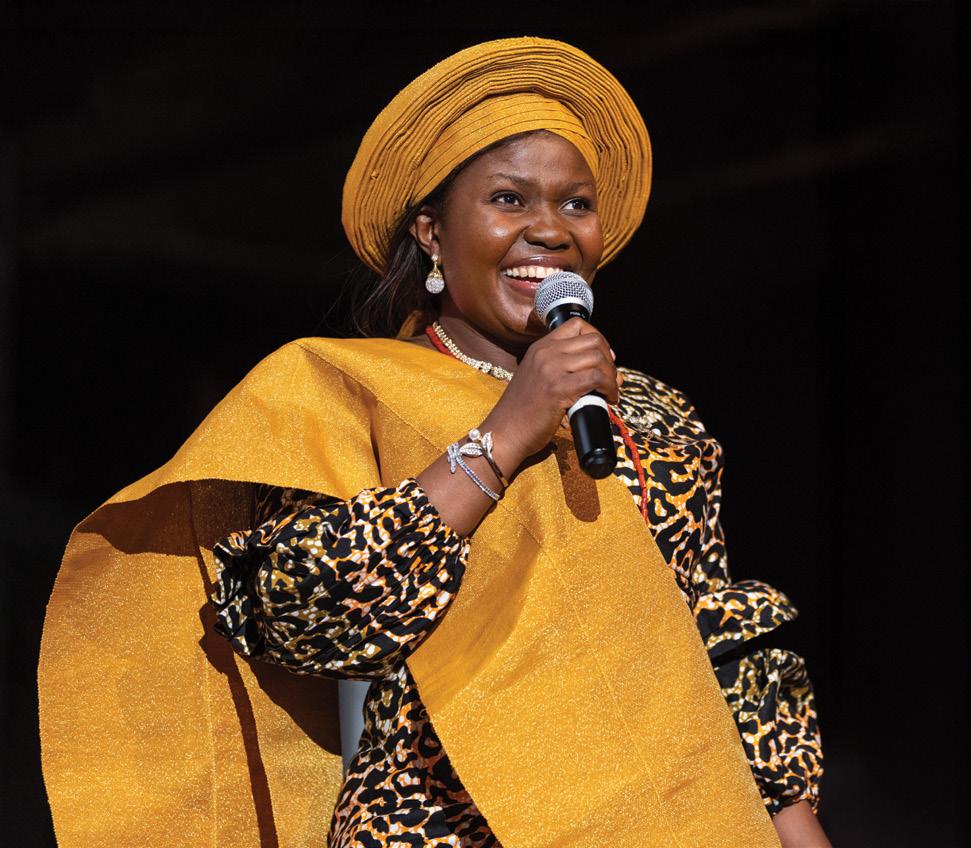
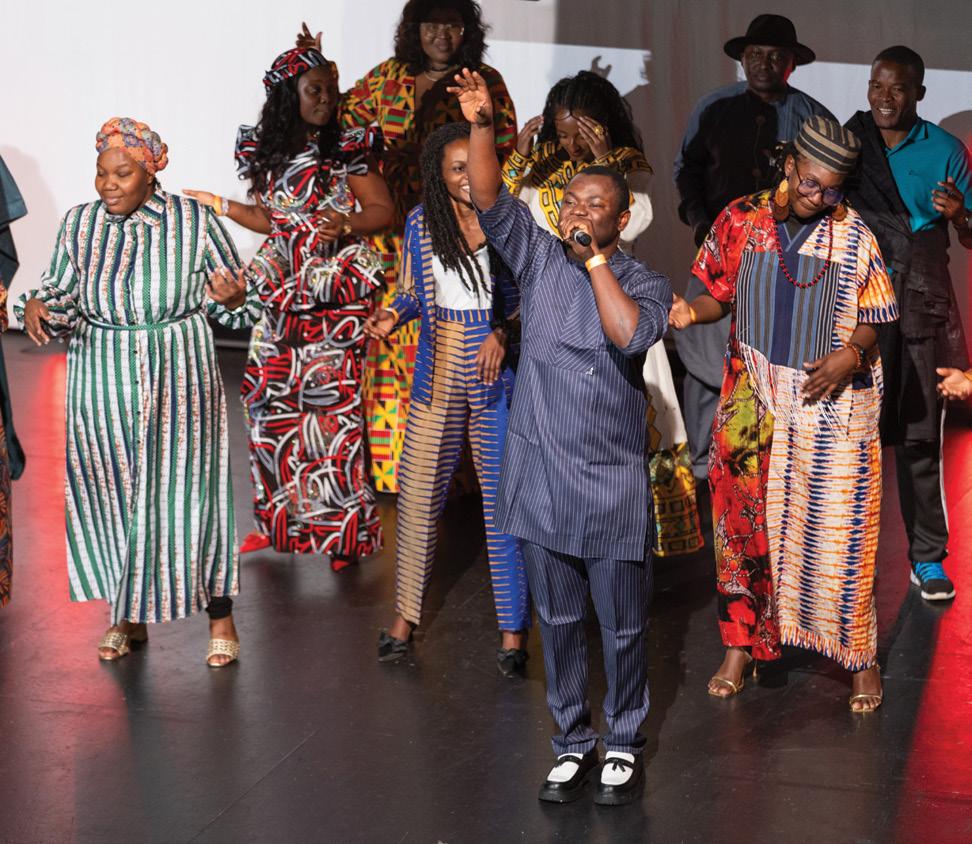

Each fall, the African Graduate Student Association (AGSA) and OGISL host Taste of Africa, AGSA’s biggest event of the year. Held during International Education Week, the event highlights not only the differences among the great countries on the African continent, but also the beautiful similarities and parallels throughout Africa and beyond. Taste of Africa features traditional dances, songs, and skits from Botswana, Ghana, Kenya, and Nigeria; a fashion show; and an invitation to dinner with a sampling of African foods, including puff-puffs and jollof rice. This annual event brings the rich traditions of Africa to life, giving students on campus the opportunity to participate in a cultural exchange right here in West Haven.
As part of its lineup of spring events, the ISC hosts Holi, the vibrant Hindu festival that marks the arrival of spring after the dark of winter and the victory of good over evil. This past April, ISC hosted over 200 students behind South Campus Hall when beautiful weather offered a perfect chance for an outdoor gathering. Attendees celebrated by throwing clouds of colored powder and dancing, becoming a true part of the festive scene as they became covered in brilliant hues. This created a vibrantly joyful atmosphere, fitting to usher in the start of a new season of growth and renewal, and giving the University community the chance to experience the start of spring from a whole new perspective.



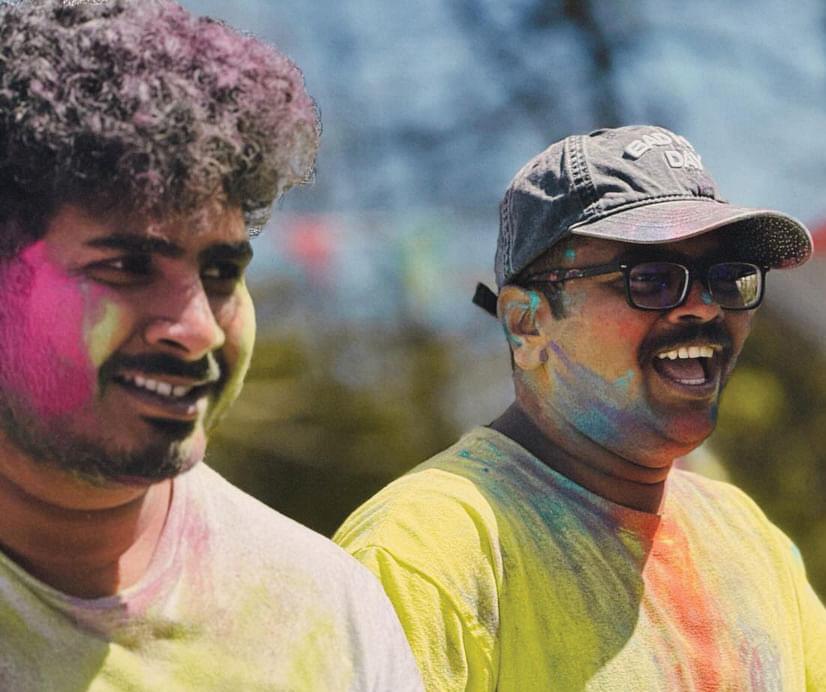

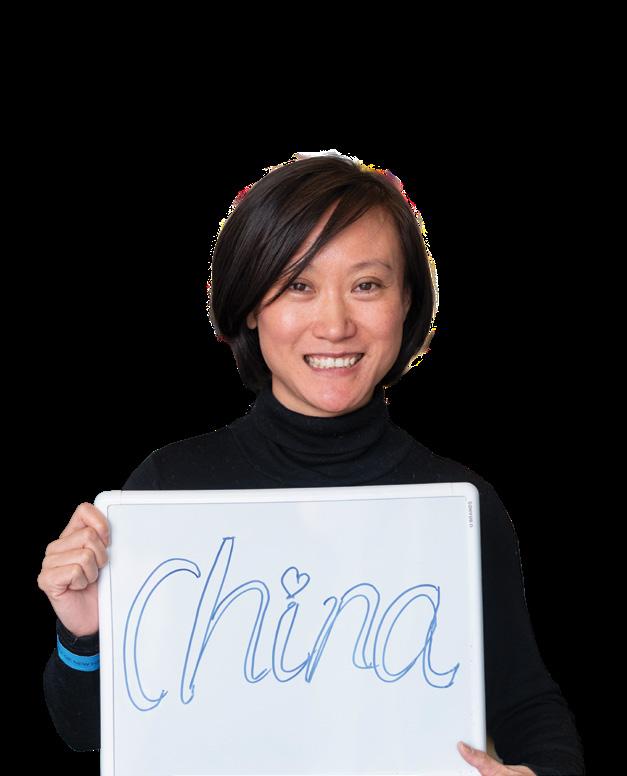

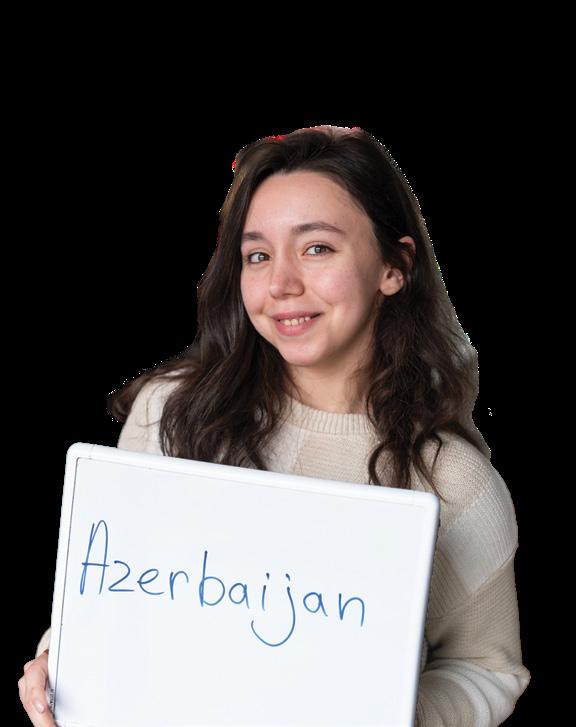
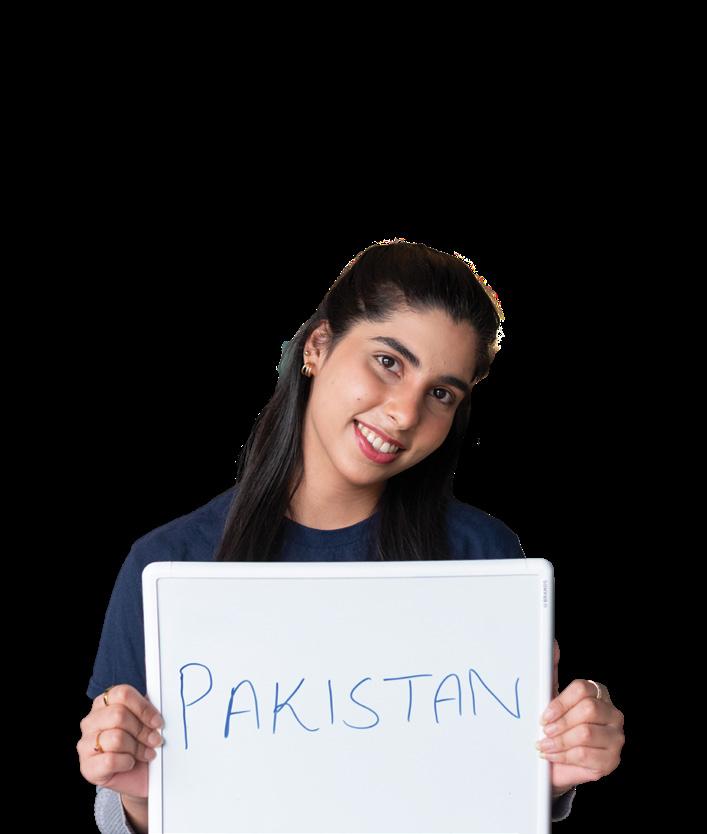
As globalization makes our world more interconnected, the University of New Haven continues to examine and refine our vision of serving a broader global constituency, inviting individuals from across the globe to join our journey on their pathway to success.
The University has a long-standing legacy of offering international programming and currently educates students from more than 70 countries. We are renowned for our academic excellence, unique entrepreneurial and research-focused spirit, and the driven vision that places our students side by side with talented professors, industry leaders, and equally motivated peers.
OGISL is the main hub for all graduate and international student needs, engagement, support, and services. The office provides personal support, including navigating campus life and adapting to student life in the United States. Orientation is hosted at the beginning of each term for new graduate and international students.
A signature event of note (pictured here) is International Student Welcome Day.




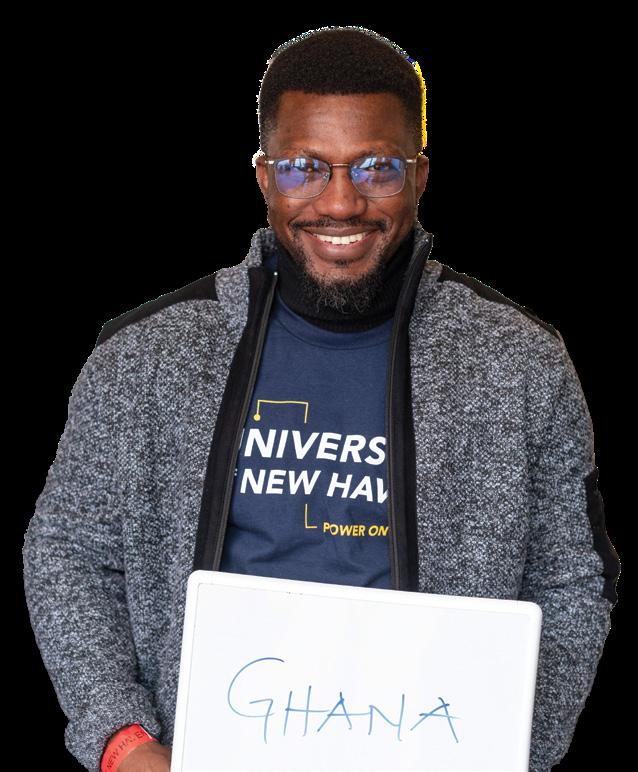
For Lunar New Year, the Asian American Student Union (AASU) hosts its biggest spring semester event in collaboration with OGISL. This past year, it festooned the German Club Ballroom in lucky red decorations. Celebrations included students and off-campus guests, showcasing performances, including martial arts, lion and dragon dances, music and Bian Lian, a Sichuan opera tradition of quick-changing masks.

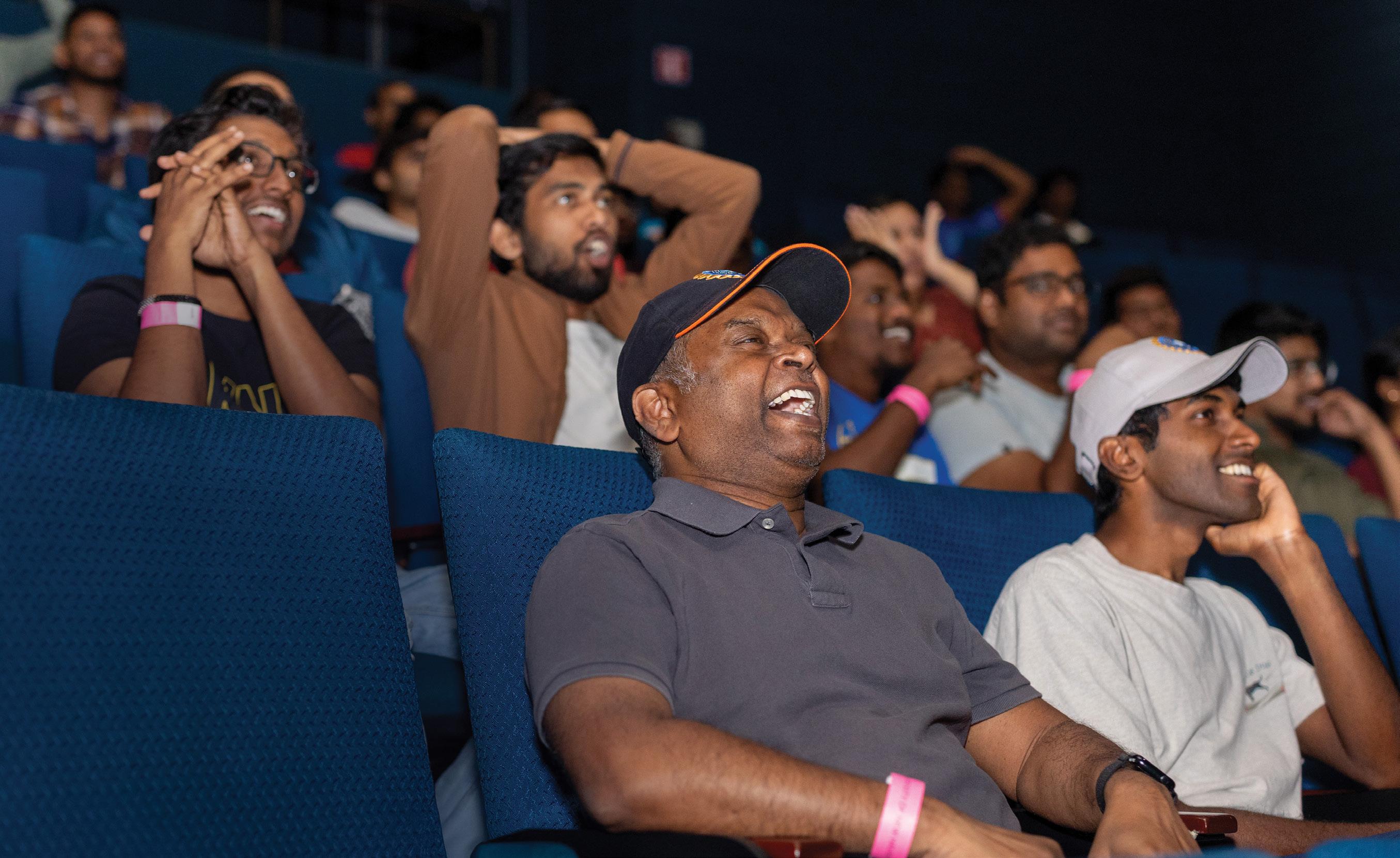
Summer 2024 brought the India vs. Pakistan Cricket World Cup match to a New York stadium, and watch parties sprang up across the region. We joined fans of the world’s second most popular sport with our own viewing party in Bucknall Theater, bringing together hundreds of campus community members for some exciting action and, of course, plenty of delicious snacks.
The University of New Haven is profoundly committed to deliver on our mission — preparing students to lead purposeful and fulfilling lives in a global society by providing the highest-quality education through experiential, collaborative, and discoverybased learning. This charge is deeply personal to each and every one of us as it is the focus of the institution to provide an unprecedented return on investment for its students. True to this mission and the University's embedded can-do spirit, our community members — including students, alumni, faculty, and staff — are active participants in working to address complex problems with an eye toward solutions and a brighter future for all.
READ ON TO WITNESS JUST A HANDFUL OF THESE POWERFUL STORIES FROM CHARGER NATION
BY COURTNEY WESTLAKE
Growing up in the Bahamas, Daniah Miller ’15 always dreamed of studying abroad. But she knew that goal was out of the question without a full scholarship.
“Even though I love my country, community, and culture, I always wanted to live elsewhere for a time,” she says. “I wanted to experience a different culture, pace of life, and part of the world.”
In 2010, the scholarship search was a manual, labor-intensive process. Daniah’s father, a middle school principal, made regular trips to the Ministry of Education to collect scholarship applications. Daniah applied to every one she could find.
In the flurry, she stumbled upon a unique opportunity: the Gerace Research Centre Scholarship offered for STEM fields through a partnership between the Bahamian Ministry of Education and the University of New Haven.
“When I got the call in August 2010 that I had received a full scholarship, I was in complete disbelief,” she says.
In fact, Daniah didn’t even know where Connecticut was! Her first experience with the Northeastern United States was when her parents dropped her off for the fall semester.
With a strong background in math and science, Daniah chose to study Civil Engineering at New Haven. The program was rigorous, and the learning
curve steep, but — committed to honoring her STEM scholarship — she stayed the course.
Looking back, Daniah now recognizes how much her undergrad years were shaped by untreated depression. Yet the challenges she faced also sparked a deeper understanding of herself and planted the seed for a more purpose-driven future.
After graduation, Daniah worked briefly as a staff engineer before making the difficult decision to change paths.
“After school, I shut down completely and ran into a wall,” she acknowledges. “When I got out of that headspace, I realized how much I dragged myself through.”
Daniah pivoted to a new role in Maintenance Administration at the U.S. Embassy in Nassau for nearly seven years. She thrived managing logistics and teams of contractors, which aligned better with her strengths.
During this time, she also began investing in her mental health and writing about her journey. Out of that healing, Daniah’s desire to study counseling was fanned into flame, and she was inspired to pursue a master’s degree in counseling with a focus in Clinical Mental Health in 2023.
“I’m feeling much more capable to take this on, with more life skills about how to manage my time,
relationships, stress,” she says. “I’m really passionate about this.”
While on this path, Daniah also discovered a new opportunity at the Templeton World Charity Foundation. The organization, founded by the late Sir John Templeton, is dedicated to funding innovative research that supports human flourishing through a global portfolio of grants. Daniah took the leap into a project management role in January 2024.
“Our founder was a firm believer that we can be a catalyst for change, even if we don’t necessarily see the direct impact,” Daniah explains. “It’s valuable to simply move the needle on an issue. That’s a really salient point that we take to the regions we live and work in.”
At Templeton, Daniah helps manage longterm development grants focused on free market economies, entrepreneurship, and character development in low- and middle-income countries in the Global South. She liaises with grantees and program officers, often traveling around the world to help support projects with the potential to transform communities.
“Change isn’t made overnight, but I enjoy the stories of impact that come out of the projects we’ve funded, and I especially enjoy when we’re able to hear the grantees speak about their work first-hand,”

she says. “Our researchers are not going into regions with preconceived notions or judgment — just being curious, asking questions, and exploring what change they can impact. It’s super fulfilling.”
Daniah has no doubt that the diversity of thought and experiences she encountered while at New Haven prepared her to navigate such a global environment with “courageous curiosity.”
“I think it is incredibly important to be able to embrace, tolerate, and advocate for difference in tertiary education because it fundamentally changes students, shaping them into global citizens capable of compassion and complex care,” Daniah shares. “I learned to stay open, to listen, to love and be loved by people who were nothing like me. That is a gift the University of New Haven gave me.”
and attentive,” Daniah recalls. “When my advisor Jean Nocito-Gobel, who is now retired, wrote my recommendation letter for graduate school, I read it and wept. I didn’t even realize how much the faculty in the engineering department were rooting for me.”
“I definitely chose the right university and had the best environment; I just picked the wrong thing to study, and I wasn’t well,” she adds. “But studying abroad as an international student changed my life — it made my world so much bigger than I thought was even possible and helped me to cultivate the confidence to be myself.”
...Studying abroad as an international student changed my life — it made my world so much bigger than I thought was even possible and helped me to cultivate the confidence to be myself.
DANIAH MILLER ’15
Although she struggled during times of poor mental health, Daniah was quite active as an undergraduate, spending time in the library and in Tagliatela working on problem sets, meeting with peers and professors, and getting help with course material.
Union; “I missed many meetings, but the executive boards never let me slip through their fingers,” she recalls. And she got a job in the Office of Undergraduate Admissions and became a residential advisor as a junior.
“Being an RA was one of my favorite experiences from college; staff members became lifelong friends who I still travel to the U.S. to visit,” Daniah says.
Today, she urges students to ask for help and seek out the resources available to them.
“The University is invested in your overall success, and they have created so many wonderful opportunities for you to receive support. Take advantage of them,” she advises.
As for what’s next, Daniah is embracing the unknown. She plans to continue her work at Templeton while finishing her graduate degree and hopes to eventually work with clients and create resources for those without access to therapy.
Although her engineering studies were difficult, she says the people made all the difference. “The faculty at New Haven was incredibly understanding
She was involved in the Society of Women Engineers and an honorary member of the Caribbean Student Association and Black Student
“The world has changed so much since I was a freshman at New Haven, and I haven’t ended up anywhere close to where I thought I wanted to be. Instead of drafting a five-year plan, I’m going to trust that, in five years, Future Daniah will have all the information, vision, and clarity she needs to make the best possible decision for our steps forward,” she says. “For now, I intend to simply do my best.”
First things first — it’s virtually impossible to explain what Aemin Becker does for a living. In fact, this is a challenge she struggles with as she builds a deeply impressive resume of global education and professional experience.
For one thing, she’s not at liberty to discuss the many projects of national and international significance she performs for various clients across the U.S. and foreign governments as a consultant for Booz Allen Hamilton. And then there’s the changing nature of what it is she does for these clients.
“It’s very hard for me to boil it down. My work changes about once a year whenever the time comes to take on a new project and switch positions.”
Some of those projects have included work for the Department of Homeland Security and the Department of Defense. She has worked on writing and research projects and cyber organizational design. She helped ensure the 2024 RNC and DNC had preparedness exercises in place. And now she works on a special program within the Department of Defense, leading a fluctuating team of 6–8 people, “taking care of a special population of interest for the U.S. government.” That’s all she’s able to say about that.
Suffice it to say, Aemin’s job is critically important and wildly complex, and it all started at the University of New Haven.
“Without the University of New Haven, I wouldn’t have had the experiences that gave me the confidence to pursue different opportunities.”
A big part of those experiences was Model United Nations (MUN), a program that began at the University just as Aemin arrived as an incoming freshman. In a way, MUN proved to be the making of her, revealing majors and programs she didn’t
BY JULIA TOLSTRUP
know about previously. It played a role in her ultimate decision to double major in political science and national security, with minors in Russian, criminal justice, sociology, and global studies.
But it wasn’t just a potent mix of academics that set Aemin on the path she’s on today.
“Many students think that all they need is the right series of classes from the right school, then they’re set. But that’s not the case. It’s a lot less about the substance of what you learn and more about the skill that you take out of it.”
Some of that skill was gained during a study abroad program in Bishkek, Kyrgyzstan, between her junior and senior years. It was here that Aemin began to understand that a long-held personal and academic interest in Russia was less about the nation itself and more about post-Soviet states. Upon her return, she launched a senior thesis project on Belarus and democratization.
When it came time for her to leave the University of New Haven, after her time in Kyrgyzstan, Aemin knew she wanted an international graduate school experience that offered a Central Asian component. She landed at Sciences Po, a selective research university in Paris, joining their Paris School of International Affairs to pursue a master’s in international security.
A third-semester thesis, study abroad, or internship is standard practice at Sciences Po. For Aemin, an internship was the missing piece she’d been seeking, so, in 2019, she opted to spend two months interning at a democratization think tank in Kyiv, Ukraine.
She followed this with a U.S. State Department internship in Tbilisi, Georgia, in the Political Economic Unit, spending 16 weeks in what remains one of her favorite countries to date.
Both experiences drew heavily on her interest in post-Soviet states.
Sometimes it’s necessary to discover what we don’t want to do in order to understand what we actually want to do. For Aemin, both the think tank and State Department experiences proved less appealing in the long run, leading her to investigate consulting.
You shouldn’t lose sight of our common humanity. Everybody is interested in peace. Everybody, at their core, wants and cares about the same things. A lot of what we see is very polarized, and this hides what we have in common.
AEMIN BECKER
’18
A random Google search turned up an open source and economic threat analyst opening at Booz Allen Hamilton. She applied in December 2019, and by January 2020, with her last semester of grad school about to begin, she was hired.
And then the pandemic struck. Luckily for Aemin, she was able to ride out COVID-19 largely in Europe, emerging on the other side with her new role intact. She returned to the United States in August 2020 to begin her career.
Aside from a master’s degree and an impressive collection of international experiences, Aemin also left Paris with the man who would be her husband. Nikhil Nagarajan, whom she wed in May 2024, grew up in India. While he and Aemin waited for his U.S. visa to clear, they met up several times in Asia, offering Aemin more opportunities to round out her already extensive travel experiences.
Throughout it all, from her time at the University of New Haven, to Paris and well beyond, Model UN has remained a constant thread. Upon arrival at Sciences Po, Aemin learned that involvement in MUN counted as a degree field class, so she jumped at the chance. First, leading a team and becoming a chair in charge of the procedural aspects of a single committee, she progressed to committee assistant director before being recently promoted to department head.
“I stuck with it because every year, with new leadership, I would encounter people from all over the world. The Model UN staff are some of the most globally minded people I’ve ever met.”
That global mindedness is an important part of who Aemin Becker is today. Her belief in the benefit of international connection and understanding is a fundamental part of her worldview.
“There’s a constant perception that, when we’re in the U.S., all that really matters is day-to-day life — you get up, you go to work, maybe you work out or go to the grocery store. And when you go on vacation, perhaps you travel close to home to minimize costs. I think that people underestimate the degree to which global connections are important aspects of life. It’s that sense of global connection, those different perceptions and understandings. In the end, everybody is a human being. Everybody has a different life experience, but there are similarities. It’s important to remember that. You shouldn’t lose sight of our common humanity. Everybody is interested in peace. Everybody, at their core, wants and cares about the same things. A lot of what we see is very polarized, and this hides what we have in common.”
Perhaps her global viewpoint was written in the stars early on. At barely a week old, Aemin traveled with her mother from their home in New Jersey to Pakistan to visit her maternal relatives. Although no one could have predicted it at the time, this was the first leg of a journey that has so far led her around the world and back again.
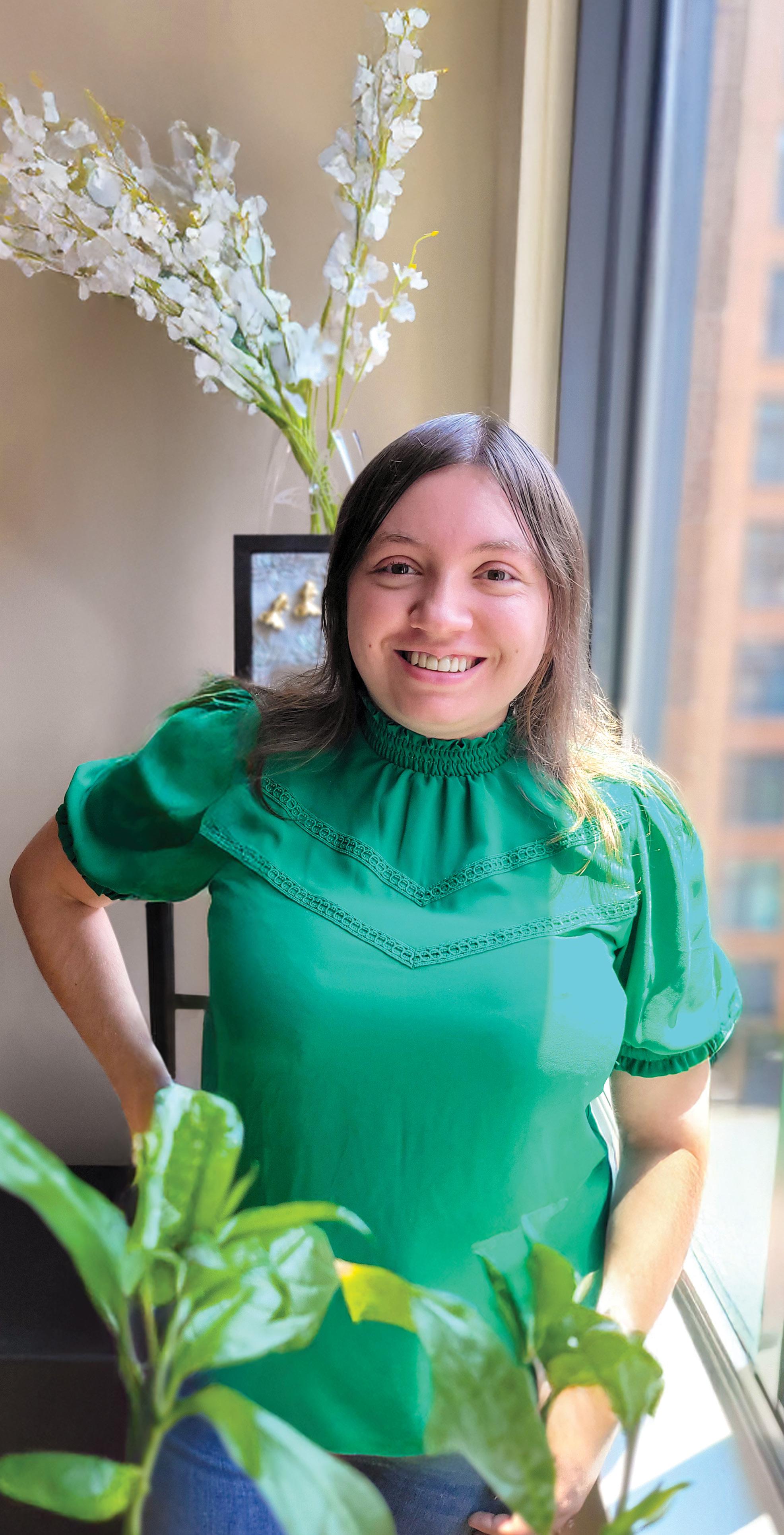
BY JACKIE HENNESSEY
It was a momentous day when Patryk Jaroszkiewicz ’16, ’20 M.S., received the Silver Medal of Merit from General Marek Boroń, the commander-in-chief of the Polish National Police, in a ceremony steeped in tradition.
“It was an incredibly moving moment, a day that I will never ever forget,” said Jaroszkiewicz, a Ph.D. fellow in the University’s Henry C. Lee College of Criminal Justice and Forensic Sciences who is pursuing his Ph.D. in Criminal Justice.
For the past decade, he has helped run the Lee College’s training program for the highestranking commanding officers and other members of the Polish National Police who annually come to the University for 10 days of training, focusing on leadership, management, and evaluation, a program that ultimately impacts 100,000 members of the Polish national police force.
Jaroszkiewicz grew up in his beloved Milanówek, a town just outside Warsaw, Poland, and lived there until his family moved to Bristol, Connecticut, when he was 14. “Poland will always be home,” he said, “just as the University of New Haven will forever be my ‘second home.’”
Throughout his career, Jaroszkiewicz has built relationships with chiefs and officers in municipal police departments around the state as well as
with the state police and agents in the FBI’s New Haven field office, and many become part of the training program. They give presentations discussing strategies and community policing approaches and sharing information about technology, equipment, and police vehicles.
Interim Lee College Dean David Schroeder, Ph.D., Patryk’s mentor when he was an extremely quiet undergraduate, encouraged him to get involved. That created the foundation for the work he does today in Connecticut and with the Polish National Police.
Dean Schroeder said the annual conference enables the Polish National Police to “experience the American criminal justice system at the highest levels the University can provide, which includes access to law enforcement, prisons, [and] courts, and they even get to participate in the Pulaski Parade in New York City.”
Patryk was nominated for the prestigious award by General Cezary Luba, director of Poland’s Centralne Biuro Śledcze Policji, the equivalent of the FBI in the U.S. He worked closely with General Luba when he was in the U.S. for last year’s training program.
During the awards ceremony held in the Mostowski Palace in Warsaw, headquarters of the Capital Police Command, General Boroń and General Luba thanked Patryk for his work.
“Over the past 10 years, Patryk Jaroszkiewicz has demonstrated extraordinary commitment and dedication to international cooperation and support in the area of training and development of the Polish police,” General Luba said. “This program not only allows Polish officers to acquire modern knowledge and skills but also supports their professional development and raises the standards of work in the Polish police. Thanks to innovative teaching methods and adapting training content to current needs, this program significantly impacts the effectiveness of police operations in Poland.”
“Additionally, Patryk actively promotes student exchanges and visits to Poland for students from the University of New Haven,” General Luba continued. “Thanks to his efforts, many young people have had the opportunity to learn about Polish culture, the legal system, and security practices. These visits not only enrich the participants’ experiences but also build lasting bonds and mutual understanding between Poland and the United States.”
The way the countries’ police forces are structured is vastly different, and this leads to great discussions, Patryk said. “They are a centralized police force,” he said. “They find our way of doing things in the U.S. very exotic, as we have more than 18,000 different local police forces as well as state police and

federal agencies. They ask, ‘how do we communicate? How do we get things done?’”
He said Polish police officials and officers are often curious about the effect gun violence has on crime and policing in the United States, as “gun violence is nearly non-existent in Poland,” he said.
At the end of the day, the work of the police here and in Poland is about public service, about ways to keep communities safe. What I have the chance to do is to build bridges across continents — to build bridges across the sea.
I’m grateful for that.
PATRYK JAROSZKIEWICZ ’16, ’20 M.S.
Because of the strict gun laws in Poland, Patryk said, fewer than one percent of the population owns a legal firearm. Having police commanders from Poland talk with police in the U.S. about how having so few guns equates to so little gun violence “really resonates with police here,” he said.
In turn, Patryk said, police here ask about how the Polish police navigate sensitive border issues with Belarus, as “the Polish National Police work with their army on the border there,” he said.
But for all the differences, Patryk said, they also share so much.
“At the end of the day, the work of the police here and in Poland is about public service, about ways to keep communities safe,” he said. “What I have the chance to do is to build bridges across continents — to build bridges across the sea. I’m grateful for that.”
Patryk had long planned to become a police officer himself — ever since he was a teenager and saw the impact of community policing in the U.S. “I thought I was invincible, and I’d put on a cape and fight crime,” he said. “But I grew older and came to see that there was much more to it.”
Three years ago, just as he was applying to police departments to start his policing career and as he was finishing the coursework part of his Ph.D. at the University, he found out that he had colon cancer. Because he did not have health insurance at the time, he went to Poland, where he could afford to have a colonoscopy and, later, the surgery
“that saved my life.” He returned to the U.S. for chemotherapy.
Today, Patryk is cancer-free, and he continues to focus on his health while working as a rehabilitation therapist with justice system-involved youth for Community Partners in Action in Hamden, a position U New Haven professor Bill Carbone encouraged him to apply for.
“Our goal is to keep the youth from reoffending,” he said. “I truly love my work and — while it isn’t policing in the conventional sense — it’s very much part of public safety — rooted in prevention, service, and the belief that people can change.”
And he is already planning the next Polish police training at the University. In September, a delegation of Polish National Police leaders, including the commander-in-chief, will be at the University taking part in this year’s training.
“I’m really looking forward to it,” he said. “Each year, I aim to elevate the experience and make it even more impactful. It’s a meaningful collaboration — one that not only strengthens professional ties but also honors my roots and deepens the connection between Poland and the University.”
BY STEVE NEUMANN
Mechanical engineering major Alexis Fernandez ’26 has loved to travel the world ever since her grandparents took her on a trip to Italy when she was eight years old. Now she’s also been to London, Germany, Spain, and Romania, to name a few.
Fernandez, who is minoring in Italian studies, is also the vice president of U New Haven’s Society for Women Engineers. So, when she saw a Mechanical Engineering Department email about the opportunity to work on a project at the Cummins College of Engineering for Women in Pune, India, during spring break, she jumped at the chance to travel and do some good in the world.
“[Pune has] an issue where they have a lot of food waste going into the streets and polluting the area,” Fernandez said. “So, the college wanted to make a pyrolysis machine to turn this waste into biochar, which can be used as a fertilizer.”
The pyrolysis process can produce other valuable products, such as Bio-Oil, which can be used as a fuel substitute for diesel or heating oil and serves as a chemical raw material for manufacturing products like plastics, resins, and even pharmaceuticals. Additionally, biochar can be converted into activated carbon for use in air and water filtration systems.
The project Fernandez worked on was made possible through a collaboration between Cummins College and U New Haven, coordinated stateside by Nagasree Garapati, assistant professor of chemical engineering.
Fernandez was one of five students who worked on the project. The students started the project in fall of 2024, traveled to India over spring break in 2025, and continued to work on the project during the spring semester.
“I performed the heat rate analysis for the pyrolysis machine, which helped me make informed decisions on material selection and recommendation for the team,” Fernandez said.
Fernandez’s work is critical to a project like this because pyrolysis involves heating materials in the absence of oxygen to break them down. Heat rate analysis helps ensure the machine supplies heat at a controlled and optimal rate. This minimizes energy waste and maximizes conversion of the waste into useful products like biochar.
“I also had the opportunity to travel to Pune and see the community that this project would be impacting,” Fernandez added. “This experience helped me appreciate just how integral engineering is to society.”
The college, established in 1991 with the support of the Cummins India Foundation, is the first allwomen engineering college in India. The college is run by the education society Maharshi Karve Stree Shikshan Samstha, whose stated vision is “women empowerment through lifeenriching mantras of education.”
In addition to sponsoring the college, the Cummins India Foundation also supports the Poona School
and Home for the Blind, which houses close to 150 girls and “helps students achieve dignity through self-reliance.”
“As a woman who has always been interested in math and science, I knew I’d be in the minority once I got to college,” Fernandez said. “But I feel empowered as a woman because I want to make a difference — I want my name to be on the projects that matter.”
“Engineering has a role in pretty much everything that goes on in the world, and it is important to me that women are in the room where the important conversations are being had,” Fernandez added. “Not just as the secretaries, but as the decision makers.”
Fernandez credits her father for her initial love of engineering.
“My dad would always do different crafts with me when I was younger, and every Christmas we would do a LEGO set together,” Fernandez said. Her lifelong need to be hands-on and creative even prompted Fernandez to make some extracurricular use of U New Haven’s Schaub Makerspace this past spring.
Engineering has a role in pretty much everything that goes on in the world, and it is important to me that women are in the room where the important conversations are being had. Not just as the secretaries, but as the decision makers.
ALEXIS FERNANDEZ
“I was coming up dry when I was trying to figure out what to get my mom for Mother’s Day,” Fernandez said. “I knew she liked PEZ candy, so I did a scan of my face and used the 3D printer to design a PEZ dispenser with my face on the head.”
Though Fernandez has made international travel a priority throughout her college career, she is just as busy on the West Haven campus. In addition to being vice president of the Society for Women Engineers, she is also president of her sorority, Delta Phi Epsilon, works in the study abroad office, and serves as a tour guide on campus.
“I don’t like to sit still for too long; I like to be busy,” Fernandez said.
Looking ahead to her senior year, Fernandez is contemplating continuing her education with a master’s degree or entering the engineering workforce.
Currently, she’s doing an internship in the combustion turbines department of National Grid, an energy company on Long Island, New York. Last summer, she interned in the maintenance services department of National Grid’s E. F. Barrett Power Station, where she learned about power plant operations and even got to see a steam turbine reconstruction.
Another alternative for Fernandez would be to start a career overseas, and she already has one in mind — if the opportunity were to ever present itself.
One Christmas when she was a child, Fernandez told her dad that she wanted to be the person who makes the LEGO sets they were working with — and she actually had a chance to take a step toward that goal when she did a study abroad semester at U New Haven’s first international satellite campus in Prato, Italy, last year.
“I took all my engineering classes over there and a couple of Italian classes,” Fernandez said. “While there, I took a trip to Denmark to the LEGO factory, and I’ve been learning Danish ever since — that way I could maybe be an engineer there and make LEGO sets.”
Fernandez has also thought about pursuing opportunities in engineering that would satisfy her lifelong wanderlust, including the United States Air Force and Engineers Without Borders.
“I don’t know if I’m built for the military,” Fernandez said, “but Engineers Without Borders does a lot of community work like I did in India, and there’s a chapter at Yale I’m thinking about joining.”
Whatever Fernandez ends up doing when she graduates, the combination of her facility with languages and her travel experiences will serve her well as she goes on to use her engineering education to try and build a better world.

BY JULIA TOLSTRUP
A semester at the University of New Haven’s satellite campus in Prato, Italy, instilled and nurtured skills and experiences that Maeve Moore knows she wouldn’t have had otherwise. Despite a childhood spent navigating the NYC public transit system, traveling internationally to places like Canada and London, and visiting relatives in Ireland, her time in Prato was different. Most significantly, it was the first time she traveled without her family, an experience that pushed her to grow exponentially. In addition to the huge confidence boost this provided, it taught Maeve to be adaptable in unfamiliar situations — when the only person she had to rely on was herself.
“Traveling to a lot of different places made me feel more confident in my ability to do major things,” she explained.
And did she ever do major things. Not only did Maeve make her way to Prato on her own, while there, she took side trips to destinations around Italy, including Florence, Rome, Milan, Siena, Viareggio, Lucca, and Verona — as well as a spring break trip to Switzerland, time with family in Ireland, and travels to Amsterdam and Munich. If she wasn’t a seasoned traveler when she left, she certainly was by the time she returned.
Spending time abroad also began to shift Maeve’s worldview. For starters, the relaxed lifestyle in Italy was a stark contrast to the fast-paced living she was used to growing up in the Northeast United States. Until this experience, she knew just one way of life, and it was a revelation to discover that it was just one of many.
Further enriching this cultural shift, a program called Conversation Exchange paired University of New Haven students with students from local high schools and colleges, giving them the chance to practice their language skills and become more involved in the community. They got to know one another, dispelling myths and stereotypes each carried about the other’s country and culture, and it turned out they had more in common and far fewer differences than they realized.
“Conversation Exchange was a great way to really understand the Italian lifestyle, talking to people our age every Tuesday evening to make friends and become more involved in the local community,” Maeve recalled.
Such a simple concept, but it’s one that has proved immensely powerful in bringing together students who have all lived through the same global events from vastly different perspectives.
We all were growing up at the exact same time, just in different places.
MAEVE
MOORE ’21
As Maeve put it, “We all were growing up at the exact same time, just in different places.”
It wasn’t just peers that Maeve and her classmates got to know. As part of the campus dining experience in Italy, the University of New Haven offers access to local restaurants, and the owners of these small businesses embrace their culinary charges like family.
Maeve recounted restaurateurs celebrating student birthdays with special desserts, candles, and songs, making them feel like they were truly part of the Prato community.
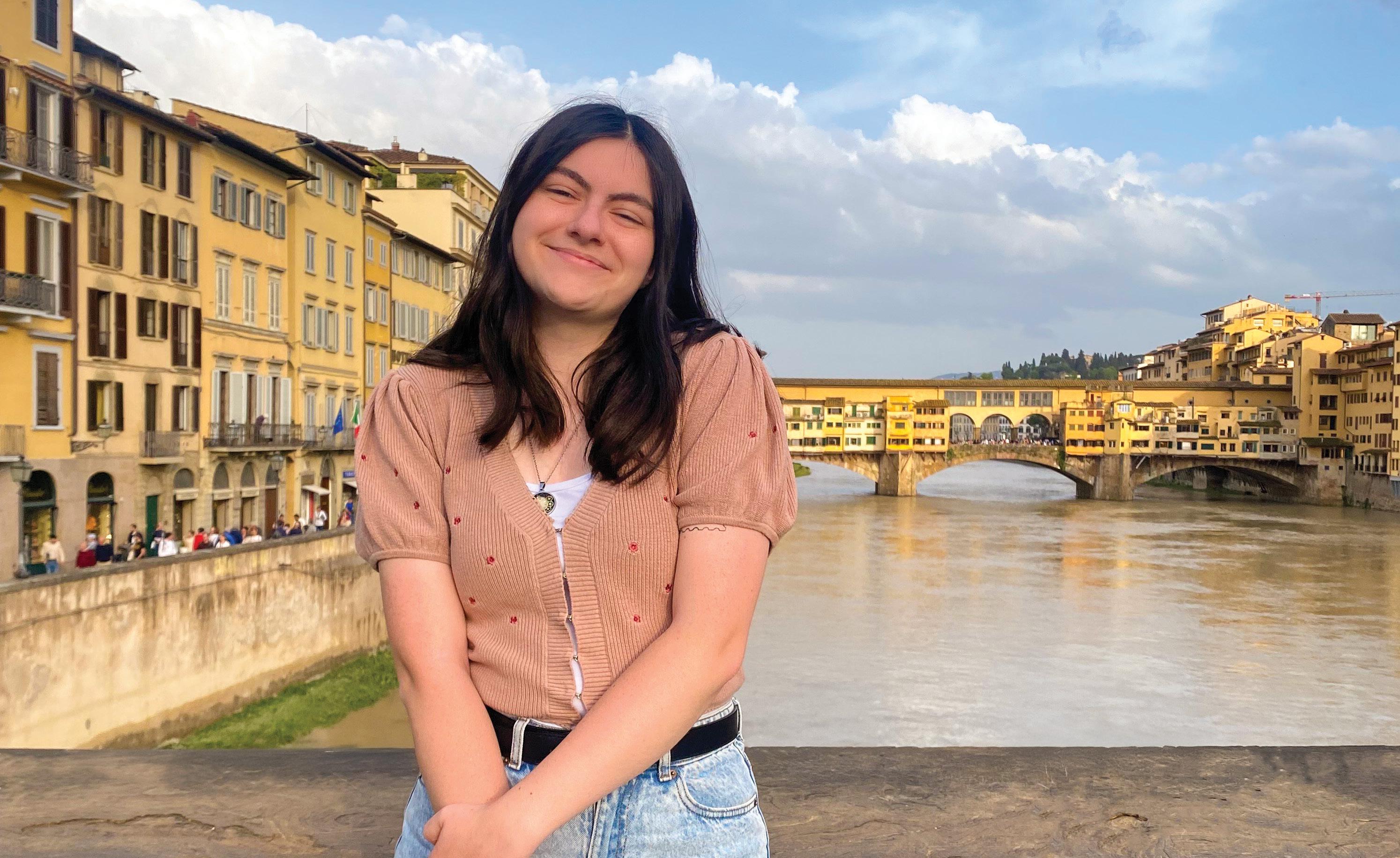
When it was time to travel home from Italy, Maeve had a full schedule waiting for her in Connecticut. When we spoke in mid-June, she’d been back barely a month, stopping at home for a week and a half before moving back to campus to dive into her new role as orientation coordinator.
To say Maeve keeps busy is an understatement. As an incoming first year majoring in psychology with a concentration in forensics, a unique offering that led her to the University of New Haven in the first place, she hit the ground running by joining one of the enhanced living communities on campus. These residential programs incorporate academically based themes and build community through shared learning and intentional student engagement. Living alongside other psych majors gave her the opportunity for group study and collaboration on events that helped build bonds with her classmates.
An avid reader, Maeve also joined a book club right off the bat, and she’s a member of Alpha Lambda Delta, a chapter of the national honor society that recognizes high scholastic achievement. But it has been her involvement with new student orientation and the Undergraduate Student
Government Association (USGA) that has shaped her time at the University of New Haven so far.
During the summer after her first year, Maeve signed on as an orientation and transition leader, guiding incoming first years as they learned what was in store when the fall semester arrived. Before leaving for Italy, she applied to be an orientation coordinator, a role she easily landed. She now works behind the scenes, planning and coordinating the more technical side of new student orientation.
Not one to shy away from deep involvement, Maeve joined USGA as a first-year representative. Ready for an even richer experience, she successfully applied to be the USGA executive assistant upon her return from Prato. This new opportunity will allow her to support the over 200 registered student organizations, helping them promote events and build a more dynamic community on campus.
As if all this weren’t enough, Maeve also works as a Charger Ambassador, leading prospective student tours throughout the school year. When I asked her what it is that pushes her to be all in for the University of New Haven, her answer was simple yet profound:
“I feel like I’ve never had so much opportunity before.”
It is this wealth of opportunity that Maeve wants to help cultivate for others as they arrive, giving them access to the same rich environment she has enjoyed, helping them build community and see life from different perspectives.
“In every aspect of my time here so far, I’ve made a lot of meaningful connections.”
From a first year immersed in new experiences, to Italy, and back again, it’s clear Maeve’s time at the University of New Haven continues to deliver in ways that will launch her into what is sure to be a bright future.
BY CAITLIN TRUESDALE
Armani Miller-Jackson ’16, ’17 MBA was just 20 when he graduated from the University of New Haven with both a bachelor’s degree and an MBA in hand (he had completed his bachelor’s degree at 19 before moving on to obtain his MBA through the University’s fast-track program that following year). His path to that milestone, and everything that’s come since, was shaped by a global perspective and a deep sense of purpose.
Born in Jamaica, Miller-Jackson immigrated to the United States at the age of six, settling in the Queens neighborhood of New York City. It was a diverse area with “many Caribbean immigrants, so I initially felt a strong sense of belonging,” he recalls. That changed in second grade during a spelling quiz when his teacher marked him wrong for writing “favourite” with a “u,” the British English spelling. It was a tiny difference, but for Miller-Jackson, it marked a turning point. That small red pen correction became a quiet lesson in cultural adaptation.
“While my answer wasn’t technically wrong, it was a powerful reminder that entering a new environment requires more than physical relocation, but also cultural understanding,” he says. That experience sparked in him a lifelong commitment to approaching new environments with humility and curiosity, a mindset that’s shaped both his personal and professional life.
Miller-Jackson’s passion for learning was influenced by his mother, an English teacher in both Kingston, Jamaica, and New York City. That understanding of the importance of education led him to earn a scholarship to attend a prestigious independent high school in the Northeast, and later to choose the University of New Haven, drawn by
the fast-track MBA program and the opportunity to be a Presidential Scholar.
“Grateful for the opportunities I was given, I remained committed to making the most of each experience,” he says. At the University, he dove into academics and extracurriculars alike. He credits faculty mentors such as Dr. Wentworth Boynton and Dr. Armando Rodriguez for providing the guidance and hands-on learning that prepared him for the real world of finance. From building mock portfolios that outperformed benchmarks to conducting independent studies in financial modeling, he left the University with not just a degree, but a strong foundation in real-world application.
Today, Miller-Jackson serves as a financial advisor at UBS, one of the world’s largest and most globally integrated wealth management firms. “UBS’s global footprint allows me to tap into international research, market insights, and investment solutions that help clients make informed decisions across borders,” he explains.
on both local and global scales. “That awareness is critical when helping clients preserve and grow their wealth across generations and across continents,” he says.
Despite his success in finance, Miller-Jackson has never strayed far from the values that shaped him, such as service. He is especially passionate about financial literacy and mentorship, particularly in underserved communities.
“Financial freedom isn’t defined by excessive wealth,” he says. “It’s the ability to live within one’s means and make empowered choices to work because you want to, not because you have to.
Equipping individuals with the knowledge to reach that state is key to building more equitable and sustainable financial outcomes.”
Education opened doors to attend esteemed academic institutions that sharpened my critical thinking, broadened my world view, and helped me envision how I could make a meaningful impact in society.
ARMANI MILLER-JACKSON ’16, ’17 MBA
Whether advising a business owner exploring an international exit strategy or a family managing assets in multiple countries, Miller-Jackson relies on a broad perspective and cross-border expertise.
Being part of a global firm keeps him attuned to economic and geopolitical shifts that affect clients
He brings that philosophy to his volunteer work with Oliver Scholars, a nonprofit that helps high-achieving Black and Latino students prepare for success at top independent schools and beyond. For Miller-Jackson this is a cause close to home as, “education opened doors to attend esteemed academic institutions that sharpened my critical thinking, broadened my world view, and helped me envision how I could make a meaningful impact in society.”
A program alumnus himself, he now gives back through mentorship and mock interviews with middle school students. “It’s inspiring to hear their
stories and witness, at such an early age, their passion for learning and their vision for making the world a better place,” he says. “Engaging with these future leaders reinforces the importance of mentorship and early access to opportunity.”
That kind of early support, he believes, can make all the difference — especially in a world where the road to success has evolved and become more winding. Initially, he believed “anyone regardless of social status could achieve upward mobility through a strong work ethic.” And while he still thinks that’s possible, he emphasized that it’s more complex now. With the realities of high student loan debt, rising home prices, and wage stagnation, “it will likely take longer than it previously did.”
Still, he remains optimistic and focused on service. “It’s important to chart your own path and pursue a life of purpose,” he says. “When you commit to serving your community with integrity, the rewards naturally follow.”
He encourages students and recent graduates, especially those who are first generation, to take advantage of every resource and lean into their unique stories. “Career tools can offer valuable insights into career paths that align with your personality, interests, and strengths,” he says.
From his early days navigating new cultures to his current role at a global financial institution and mentoring bright-eyed seventh graders, Armani Miller-Jackson has kept a global lens on his work and his purpose. As he looks ahead, he remains focused on expanding impact across borders, across communities, and across generations.
Armani Miller-Jackson is a Financial Advisor with UBS Financial Services Inc. a subsidiary of UBS Group AG. Member FINRA/SIPC. The information contained in this article is not a solicitation to purchase or sell investments. Any information presented is general in nature and not intended to provide individually tailored investment advice. The strategies and/or investments referenced may not be suitable for all investors as the appropriateness of a particular investment or strategy will depend on an investor's individual circumstances and objectives. Investing involves risks and there is always the potential of losing money when you invest. The views expressed herein are those of the author and may not necessarily reflect the views of UBS Financial Services Inc. Neither UBS Financial Services Inc. nor its employees (including its Financial Advisors) provide tax or legal advice. You should consult with your legal counsel and/or your accountant or tax professional regarding the legal or tax implications of a particular suggestion, strategy or investment, including any estate planning strategies, before you invest or implement.
As a firm providing wealth management services to clients, UBS Financial Services Inc. offers investment advisory services in its capacity as an SEC-registered investment adviser and brokerage services in its capacity as an SEC-registered broker-dealer. Investment advisory services and brokerage services are separate and distinct, differ in material ways and are governed by different laws and separate arrangements. It is important that you understand the ways in which we conduct business, and that you carefully read the agreements and disclosures that we provide to you about the products or services we offer. For more information, please review client relationship summary provided at ubs.com/relationshipsummary, or ask your UBS Financial Advisor for a copy.


AS I CLOSE OUT MY TERM as president of the Alumni Board, I am filled with gratitude and pride. These past few years have marked a great period of growth — not just for me personally but also for our board and alumni community. I’m especially proud of our strides in enhancing our board structure with new pillars for philanthropy, networking, and advocacy to better align with the University’s goals.
Serving as president has been a profound honor. I’ve been continually humbled by the support I’ve received from our incredible board members, faculty, staff, and our tireless Alumni Relations team. The trust they placed in me has been a gift, and I hope I’ve served them — and our broader community — well.
More than anything, I’ll miss the people. This board has become a second family. Each member brings their whole heart to the work. Their passion and dedication are contagious, and they continue to inspire me every day.
I hope this period is remembered as a time when we helped bring the board into a “more modern” era — building a foundation that aligns with
My hopes for future generations of Chargers are simple but meaningful: that they find that sweet spot where joy meets impact; that they pursue work they love — and know it matters; and that they continue to uphold the University’s values while forging new paths for themselves and others.
the University’s evolving goals and equips us to support future initiatives with greater clarity and impact.
Fittingly, this issue’s global theme resonates deeply. While a student at the University of New Haven, one of the most impactful experiences for me was getting to know people from other countries. It opened my eyes to our common grounds and the unique challenges different communities face. The University’s diverse student body and faculty naturally create an environment that prepares us for global citizenship. We graduate with both knowledge and empathy — ready to collaborate across borders, cultures, and causes.
My hopes for future generations of Chargers are simple
but meaningful: that they find that sweet spot where joy meets impact; that they pursue work they love — and know it matters; and that they continue to uphold the University’s values while forging new paths for themselves and others.
Thank you for the opportunity to serve. It’s been one of the most meaningful experiences of my life.
With gratitude,

Reece Gleadle ’14 President, University of New Haven Alumni Board of Directors
2024–2025
ALUMNI BOARD OF DIRECTORS
President Reece Gleadle ’14
Vice President
Leah Myers ’18
Secretary Meghan Kelly ’10, ’13 M.S.
Treasurer Ronald Pierce II ’16
. Djuana Beamon ’08 MBA
. Pasquale Cassella ’94 M.S.
. Joseph Cieplak ’72
. Tyler D’Amore ’14, ’16 M.S.
. Frank Harper ’79, ’85 M.S., ’85 MBA
Lindsay Margiotta ’13
. Christopher McWilliams ’93
. George Melanson ’83
. Anna Mercaldi ’19
. Nicole Pacapelli ’14, ’16 MBA
. Hannah Providence ’22
. Eric St. Amand ’15
. Colin Weber ’17
*Term concluded on June 30, 2025
STAY CONNECTED
@UNewHavenAlumni
@UNewHavenAlumni
University of New Haven Alumni Association
The Alumni Board of Directors speaks to the power of a U New Haven education in building empathy, adaptability, and global perspective.
My hope for the future of the world is everyone coming together and having more conversations centered around love, kindness, and understanding our shared fate. A stronger future is built around empathy, sustainability, and collaboration. With the help of education from U New Haven, we are empowering people — especially the younger generations — with the ability to think critically, question misinformation, and understand one another’s perspectives, helping us bridge the divides we see in today’s society.”
ANNA (MERCALDI) LAPOINTE ’19
How does the U New Haven experience mold students into global citizens? One word — flexibility. In today’s day and age, you must learn how to adapt in order to thrive. This requires flexibility in everything you do: your job, your education, your family, your neighborhood, your friends, and so on. The University provides a gateway for students to practice this both on and off-campus.”
PASQUALE (PAT) CASELLA ’94 M.S.
U New Haven prepared me to go out into the world and make a difference. The technical and critical thinking skills I learned as a student prepared me for working in broadcast and digital media, especially through experiential learning and through professors who simultaneously contribute to the industry. In my case, working for a local TV station has allowed me to not only serve my community but also tell the stories of Connecticut and beyond.”
LEAH MEYERS ’18
“U New Haven molds students into global citizens through their hands-on experiential learning approach. This applied education allows students to develop the skills necessary to grow in their field and influence those around them, fostering a mindset that embodies teamwork, inclusivity, and global development.”
NICOLE PACAPELLI ’14, ’16 MBA
“My UNH experience gave me a great foundation to think and act locally and globally. I am incredibly proud of my participation as a student-athlete, my academic experience and achievements, and my extracurricular involvement. I have UNH to thank for the distinction and recognition I have received in my professional field, including in my current role as provost and vice-chancellor of an international university in Switzerland and president of a global think tank with operations in Africa.”
FRANK HARPER ’79, ’85 M.S., ’85 MBA
“ U New Haven does a great job of being ‘a local campus with a global reach.’ I had the chance to study abroad, and it was such an eye-opening experience. It pushed me out of my comfort zone and helped me see things from a whole new perspective. Even on campus, there’s a strong global feel — whether it’s through the people you meet, the classes you take, or the opportunities you’re given. It’s an experience that stays with you.”
LINDSAY (MELANSON) MARGIOTTA ’13
“U New Haven forms global citizens. From study abroad to academic conferences and seminars, and realworld skillsets taught in the classroom, U New Haven provided the experiences I needed to excel in my career. My time working as a chemical engineering major, student government, and a winter study abroad allowed me to explore interests, grow soft skills that pay dividends in the workplace, and foster lasting friendships.”
COLIN WEBER ’17
Two weekends after the Commencement 2025 celebrations concluded, alumni from around the state, country, and world returned to campus to reconnect and reminisce. A private New Haven pizza tour down Wooster Street, guided campus tours, a family-style barbecue, and festive group gatherings welcomed all, including several graduates who had not returned to West Haven in more than four decades. Nostalgia and stories marked the weekend as alumni saw how far the University of New Haven has advanced over the past half-century, from Bethel Hall and the opening of the Peterson Library in the 1970s to the newly constructed Bergami Center for Science, Technology, and Innovation. One alumnus summed up the weekend best as he walked out of the Alumni Lounge following an evening gathering and exclaimed, “I’m just so proud to be an alum of this place!”
Learn more about other opportunities to celebrate with Charger Nation at newhaven.edu/alumni/events
We can’t wait to see you again soon!





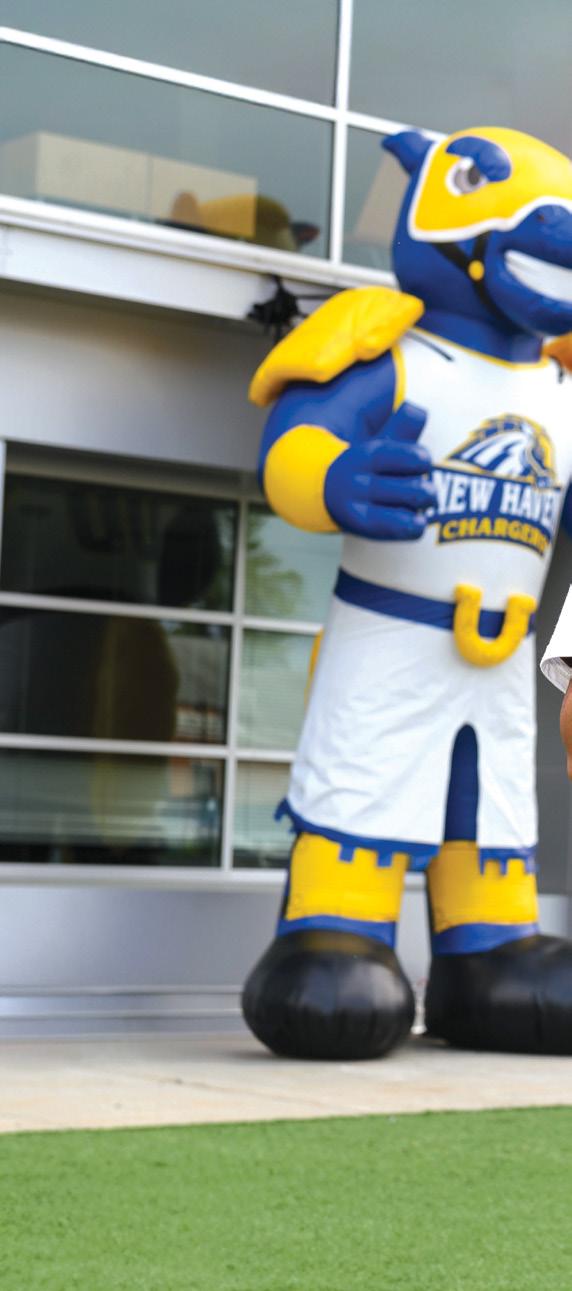




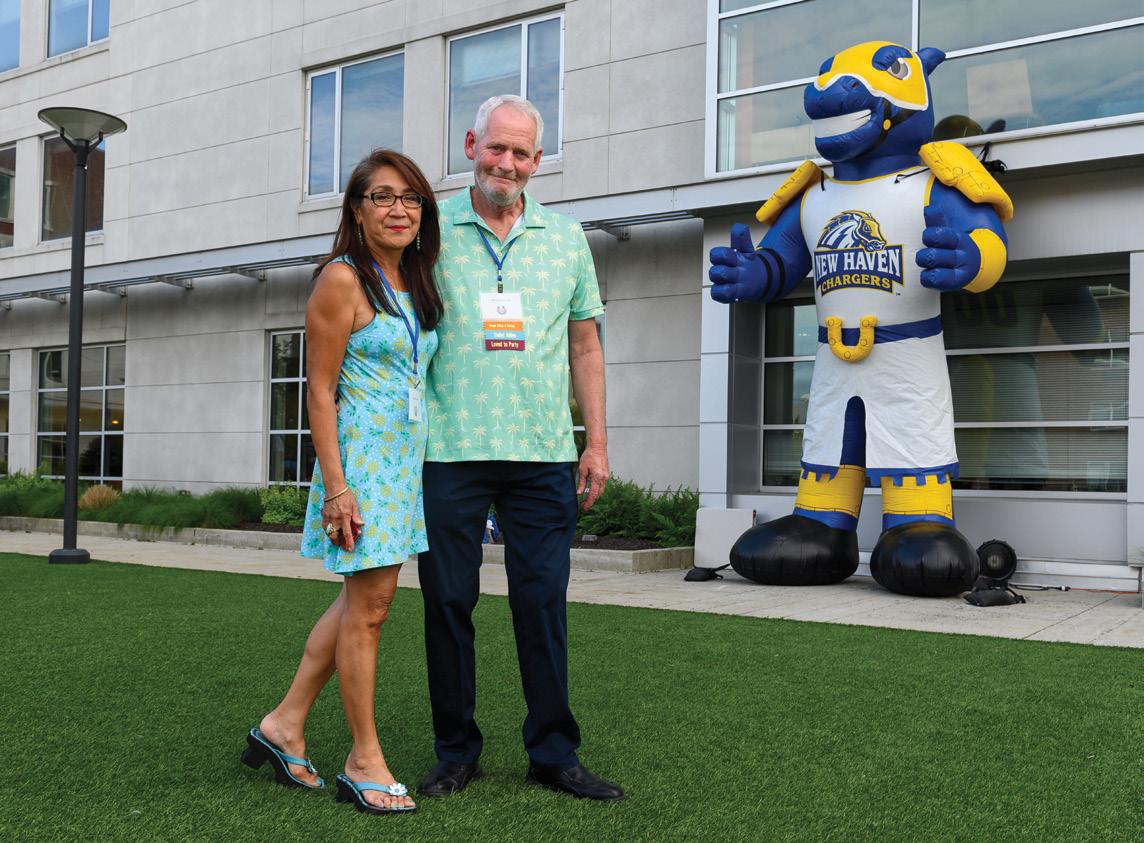

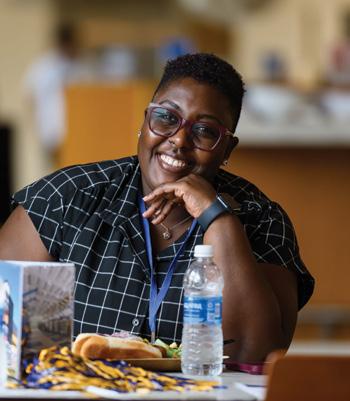

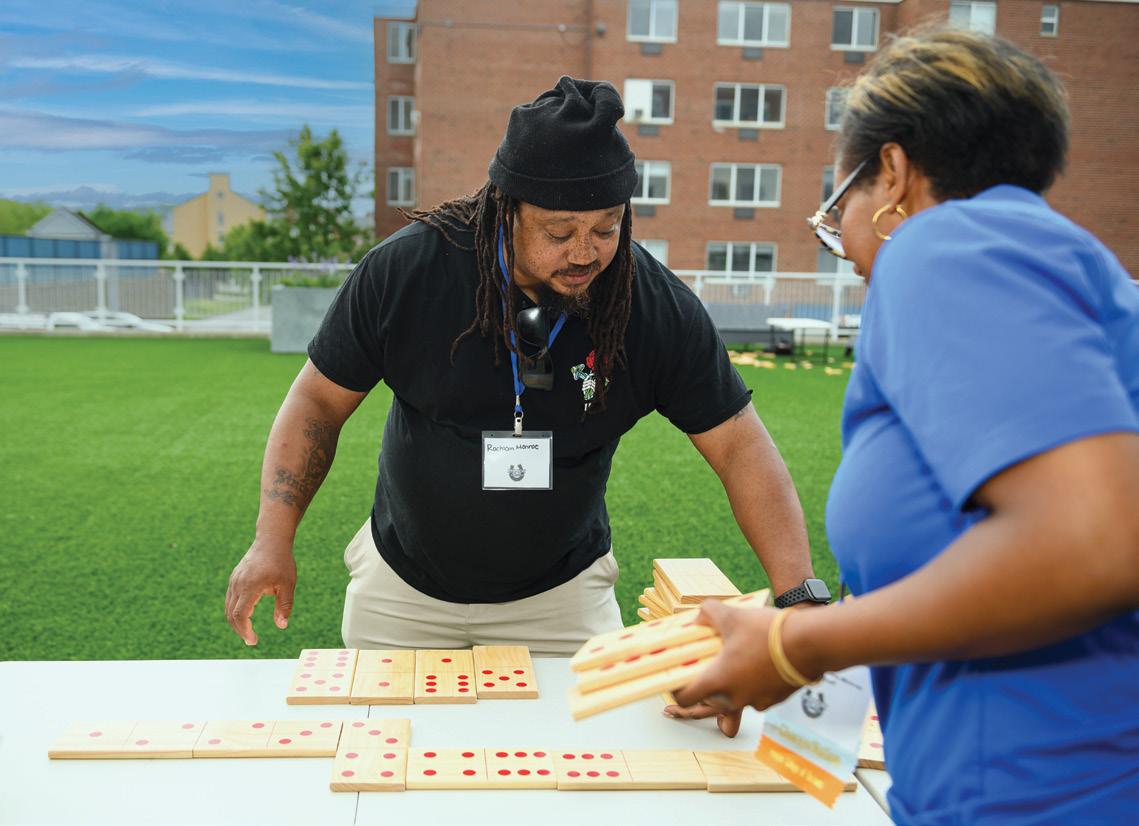

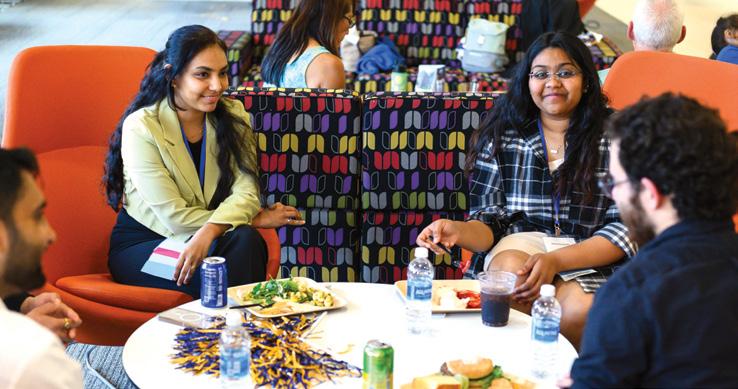
The University of New Haven has accepted a full membership invitation from the Northeast Conference (NEC) Council of Presidents and officially joined the league on July 1, 2025. The announcement was made on May 6, 2025, by NEC Commissioner Noreen Morris and University of New Haven President Jens Frederiksen, Ph.D.
New Haven will begin its transition to NCAA Division I and the NEC during the 2025-26 academic year. The Chargers will attain full Division I membership in 2028-29 following the NCAAmandated reclassification period.
“We are thrilled to welcome the University of New Haven to the Northeast Conference family,” said NEC Commissioner Noreen Morris. “Making the move to Division I is a bold step, and we’re honored that New Haven chose to take that step with us. From the start, it was clear that they share our values — putting academics, competitive excellence and the student-athlete experience at the forefront. I want to thank President Jens Frederiksen and Athletic Director Devin Crosby for their thoughtful leadership throughout this process. I’m also grateful to the NEC Council of Presidents for their support and shared vision as we continue to shape the future of the conference. We’re excited to partner with the Chargers as they make their mark in Division I and help elevate the NEC.”
Beginning with the 2025-26 academic year, New Haven is set to become the NEC’s tenth fulltime member. The Chargers will join NEC charter

members Fairleigh Dickinson University, Long Island University, Saint Francis University, and Wagner College, along with Central Connecticut State University (joined in 1997), Stonehill College (2022), Le Moyne College (2023), Chicago State University (2024), and Mercyhurst University (2024).
A member of the Northeast-10 (NE10) Conference since 2008, New Haven sponsors 20 varsity programs, 19 of which align with NECsponsored sports. The Chargers field teams in baseball, men’s and women’s basketball, men’s and women’s cross country, field hockey, football, men’s and women’s golf, women’s lacrosse, men’s and women’s soccer, softball, women’s tennis, men’s and women’s track & field (indoor and outdoor), and women’s volleyball. The Chargers also sponsor women’s rugby.
New Haven will be integrated into NEC athletic schedules beginning with the 2025-26 academic year, with the exception of football. The timing of New Haven football’s addition to the conference schedule is still to be determined.
During its reclassification, the Chargers will immediately be able to participate in NEC Championships in NCAA non-automatic qualifier sports: cross country, indoor track and field, and outdoor track and field. New Haven athletic programs will gain full NEC Championship access as early as the 2026-27 academic year, but no later than 2027-28. Per conference policy, no more than two schools undergoing reclassification may have full championship access at the same time. As the third NEC member currently in transition, New
Haven’s timeline is contingent on when the others complete their process. The Chargers will become eligible for NCAA Championship competition in 2028-29, upon successful completion of their reclassification period.
“We are thrilled about this opportunity for the University of New Haven,” said President Frederiksen. “Athletics has been and continues to be a vital driver of enrollment and brand recognition for the University. This move to the Northeast Conference and Division I positions the University for an exciting future — one consistent with the overall strategic focus on academic, professional, and global return on investment.”
Devin Crosby, New Haven’s Director of Intercollegiate Athletics, shared his excitement about the University’s transition to Division I and its new partnership with the NEC.
“This is about positioning ourselves at the highest level,” said Crosby. “The University of New Haven’s momentum under President Frederiksen’s leadership aligns naturally with our transition to NCAA Division I and the Northeast Conference. The Blue & Gold deserve this.”
New Haven boasts a proud athletic tradition, producing a National League Cy Young Award winner, a Harlon Hill Trophy recipient, and a five-time NCAA track and field champion. The Chargers have enjoyed national success across multiple sports: women’s basketball captured the national championship in 1987, men’s basketball reached the NCAA quarterfinals in 2023, and women’s volleyball has made 37 NCAA

Tournament appearances. On the gridiron, New Haven has ranked among the best in Division II and is one of only five football programs — and the only private school — to earn an NCAA playoff bid in each of the past four seasons. Since 2009, the Chargers have captured six conference football titles and play on a distinctive blueand-gold field at DellaCamera Stadium, widely
regarded as one of the most unique venues in Connecticut.
In 2023, the University unveiled the Peterson Performance Center, a state-of-the-art facility featuring a 7,000-square-foot weight room, a 60-yard turf training area, a 1,500-square-foot sports medicine center, a 2,500-square-foot football locker room, and a nutrition station
overseen by a registered dietitian. Plans are also underway for a major renovation of the Jeffery P. Hazell Athletics Center, with enhancements including upgraded locker rooms, expanded seating and viewing areas, additional team meeting space and coaches’ offices, and a reimagined lobby to honor Charger legends and the program’s championship legacy.

Head coach Jen Fallon became the conference’s alltime leader in wins by a head coach. The Chargers won their first NCAA Tournament game in program history. New Haven also finished a regular season tri-champions with Adelphi and Pace. Katie Schenk became the 7th player in program history to score 60 goals in a single season, finishing with 66. Schenk also became the program’s first All American since 2022.


An up-and-down season saw New Haven celebrate five student-athletes who received CSC Academic All-District honors for the 2025 season. Bella Chenet made her second All-Conference team in as many years. Peyton Sullivan was named to the conference All-Rookie Team and slotted in next to Chenet on the All-Conference Third Team.


Entering the season as the defending conference champion, New Haven jumped out to a 15-7 overall record by April 1. As conference play began, the Chargers found their way back to the into the playoffs for the third-straight year. Six New Haven Baseball players were named to All-Conference teams and four earned CSC Academic All-District status.

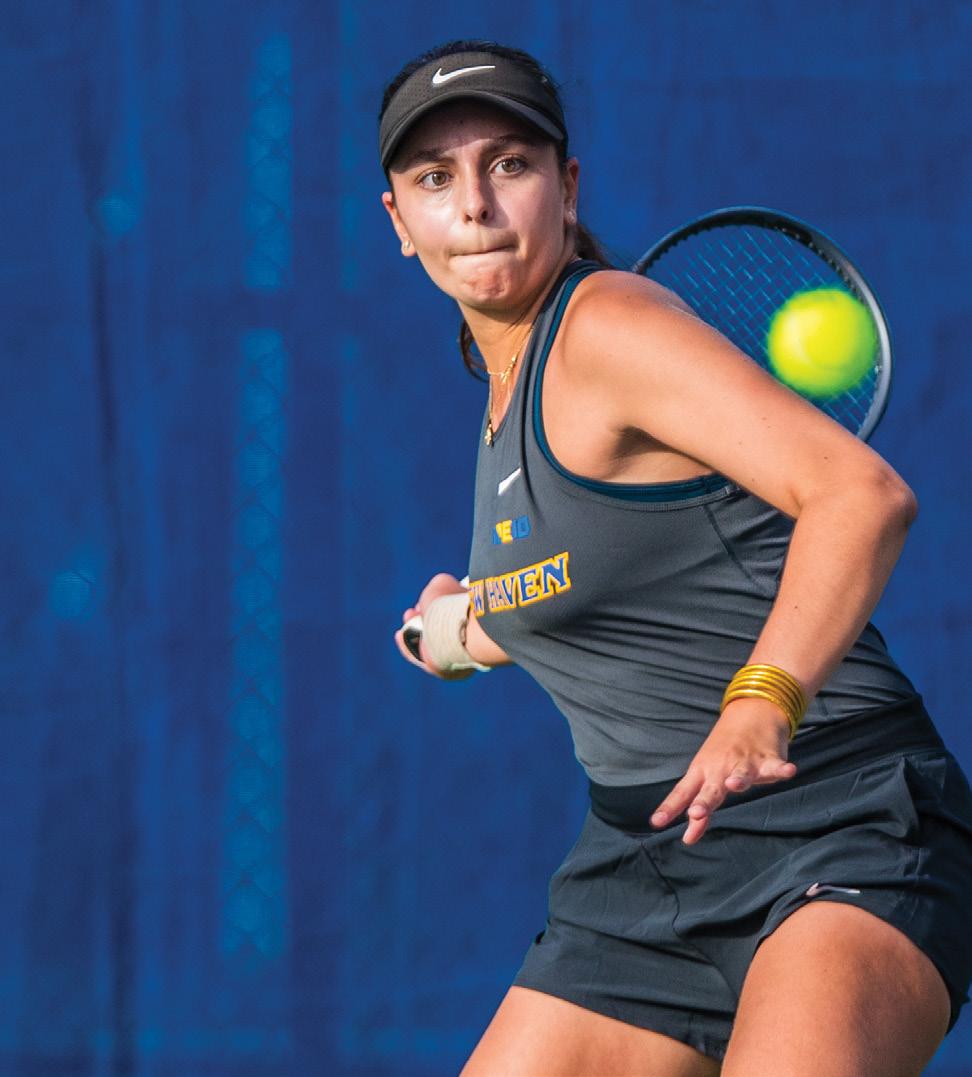

Sophomore Hermann Gavilan finished tied for 28th in the Men’s NCAA Division II Atlantic/East Regional tournament at Whispering Woods Golf Club in Erie, Pa., on April 21-22. A week earlier, at the same course, Gavilan fired a 152 to finish +8, tied for 25th at the Regional Preview. His score helped propel New Haven to a top-15 finish at the event.


Freshman Sofia Campo took home the Rookie of the Year in the conference.
Campo had a pair of top-10 finishes this season, while averaging 83.8 strokes per round. She finished second at the Hartford Hawks Spring Invitational. Campo is the first New Haven golfer to ever win Rookie of the Year.
Graduate student Wynter Flores was named First-Team All Conference, and senior Erin Earl was tabbed SecondTeam All Conference.


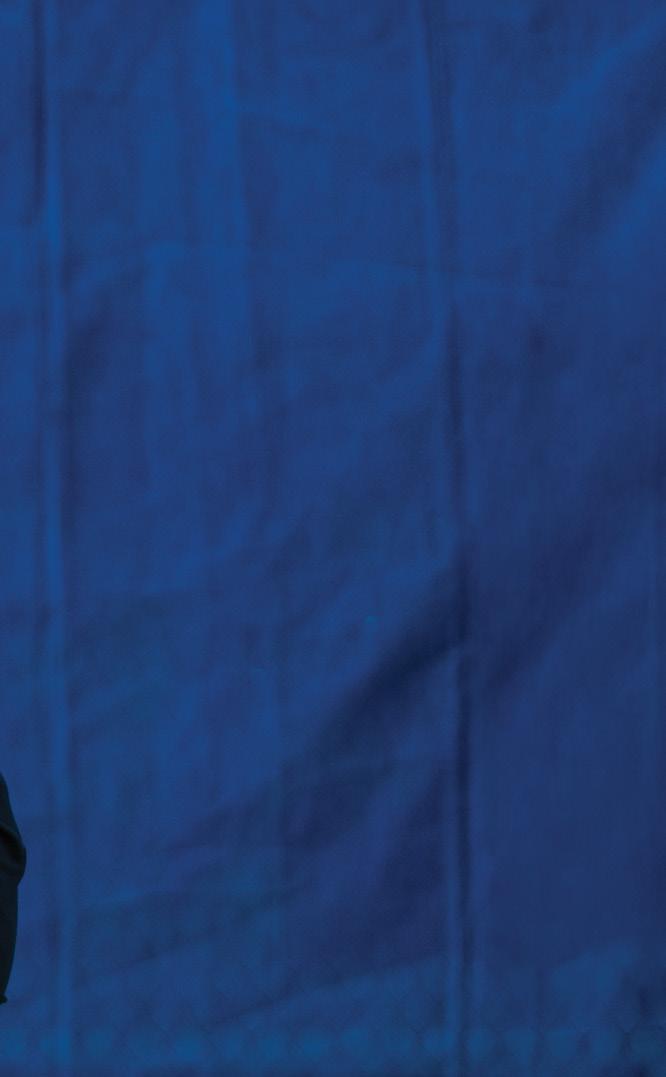

Chris Raffone’s team hosted the NCAA East Regional following the most successful season in program history. New Haven finished the year as conference champions and earned the top seed in the East Regional.

Another second-place finish in the conference was just the beginning of a magical postseason for New Haven Cross Country and Track and Field. The Blue & Gold placed four student-athletes on the All-New England list, another four earned All-East Region honors, and head coach Shaunnaya Williams earned conference Coach of the Year.

New Haven Rugby finished the spring strong by finishing in eighth place at the Collegiate Rugby Championship from April 25-27. A 27-10 first-round win over St. Bonaventure was followed by a secondround loss to Army, ending the season. Sophomore Sereana Vulaono joined the USA Falcons, the main development squad for Team USA, for matches in France following the team’s season.

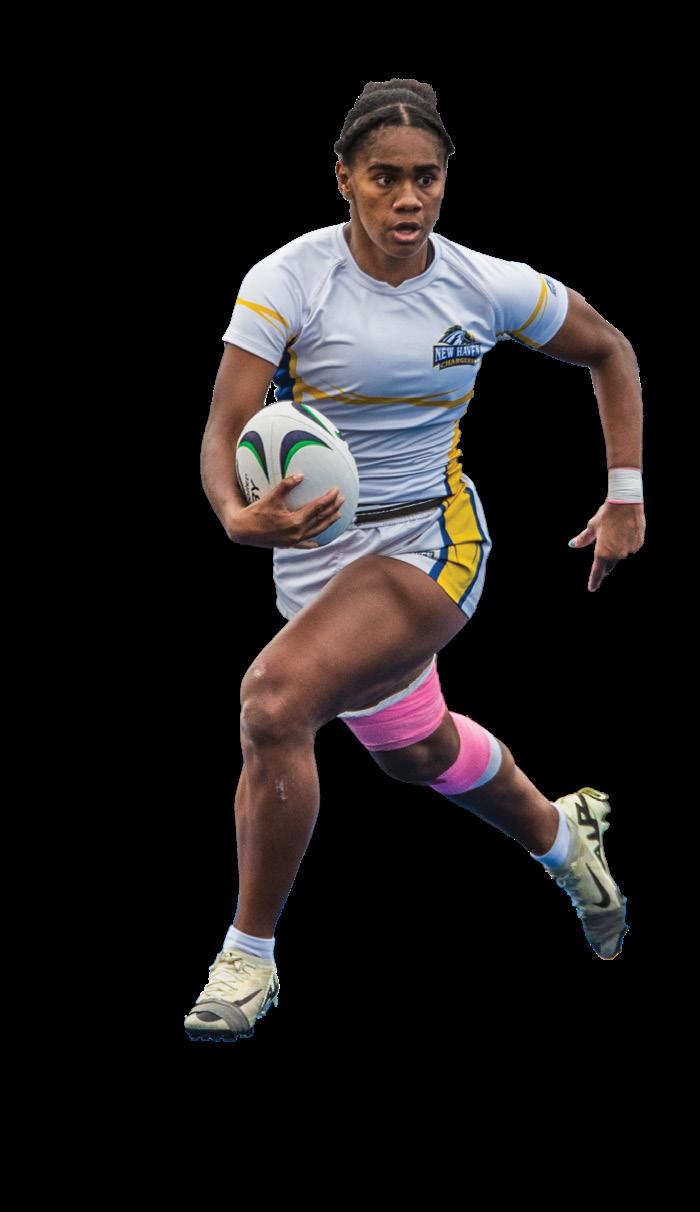
A second-place finish at the conference championship weekend propelled Jordany Dely to All-American status in the men’s 110-meter hurdles. He finished eighth in the country in the event, and his qualifying time of 13.77 seconds is a new school record, breaking his own record he had set earlier in the season.
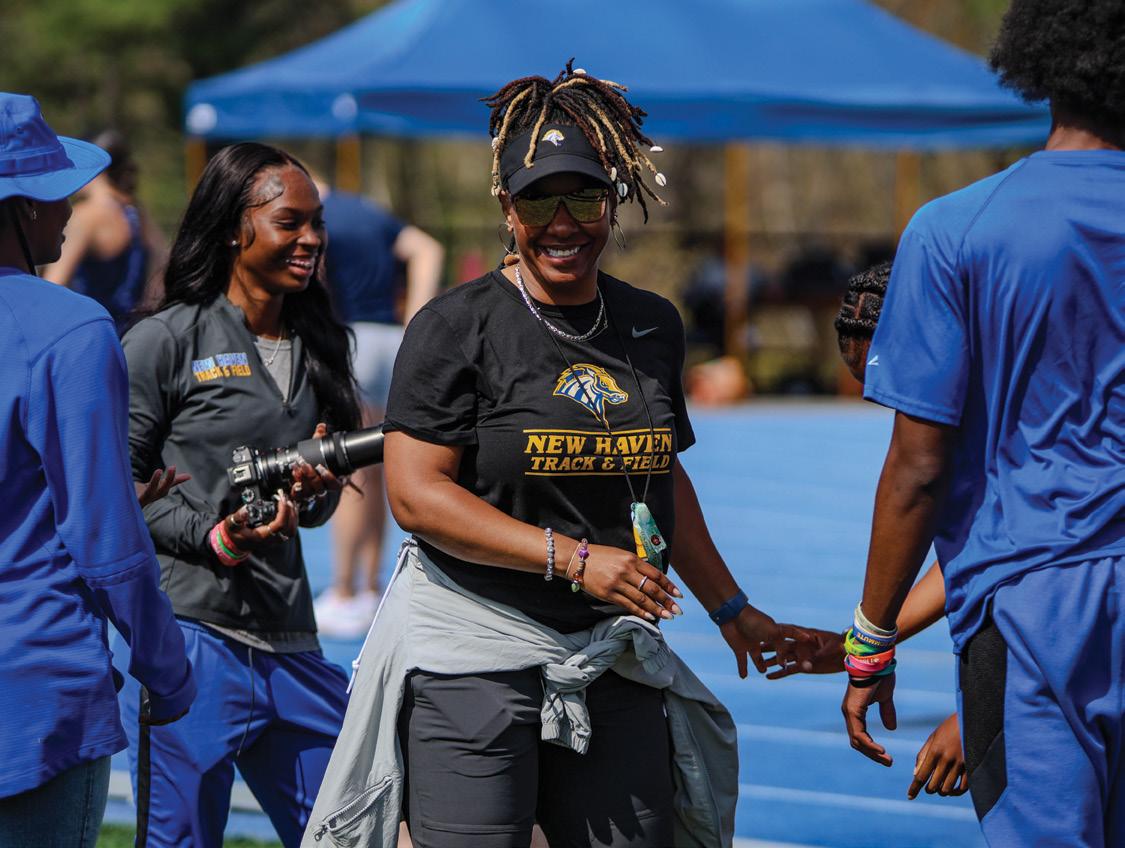



Dear Members of the University Community,
I am writing to share the sad news that Samuel S. Bergami Jr. ’85 EMBA, one of the University’s most devoted benefactors, passed away on March 7, 2025, at age 80. Sam was a longtime member of the University’s Board of Governors, serving as chair from 2006 to 2012. He and his beloved wife, Lois, have supported the University for decades, making an impact on the lives of generations of students.
One of the most visible testaments of the Bergamis’ generosity is the Bergami Center for Science, Technology, and Innovation.
The Bergamis were significant donors to the construction of the Beckerman Recreation Center and the Henry C. Lee Institute of Forensic Science, and they funded renovations for a number of significant campus facilities.
The Bergamis also created endowed scholarships and supported many academic and co-curricular initiatives, including the Bergami Family Summer Internship program.
In addition, Bergami Hall, the Bergami Cybersecurity Center, and the University’s campus in Orange bear the Bergami family name. They have also supported the Chargers Marching Band and the University’s awardwinning student-run radio station, which is located in the Lois Evalyn Bergami Broadcast Media Center. Sam was presented the University’s President’s Award in 2012.
In a 2019 issue of the Alumni Magazine, Sam said, “It has been an enriching experience for us to support an institution that does so much for its students who, in turn, work so diligently to pursue their passions and grow into their full potential. That’s why we give back as much as we do. We want to give the next generation the same opportunity to achieve their own dreams and change the world.” His magnanimous nature is one we all should strive to emulate.
The very definition of a self-made individual, Sam worked for nearly 60 years at Alinabal, Inc., moving up the ranks from a tool and die apprentice to president, CEO, and
All my best,




co-owner of the company, which under his leadership employed 400 people.
Michael Ambrose ’84 ’19 Hon., chair of the University’s Board of Governors, shared, “Sam was a remarkable individual, and he lived life to the fullest. He took great pride in his association with the University, and he and Lois always looked for ways to support the educational experience of our students. The enduring impact of Sam’s and Lois’ generosity will benefit University of New Haven students for generations to come.”
In addition to Lois, Sam is survived by his three children and seven grandchildren, including Leah Myers ’18, who is vice president of the Alumni Association’s Board of Directors, and a large extended family.
Please join me in extending our heartfelt condolences to Lois and the entire Bergami family. Let us honor Sam’s legacy by giving back, making an impact, and creating a brighter future for all.

Jens Frederiksen, Ph.D. President






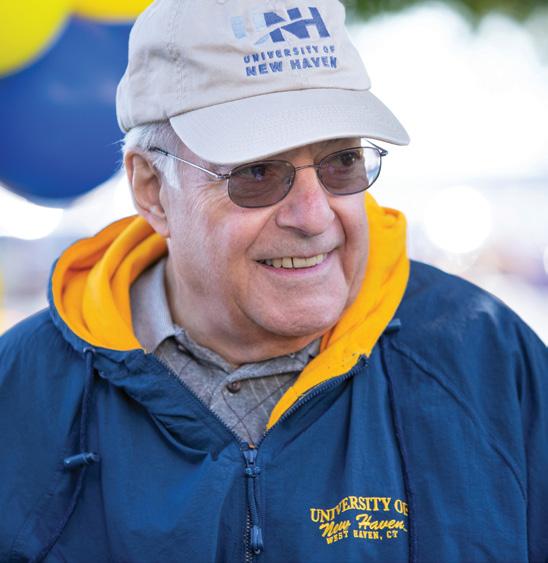


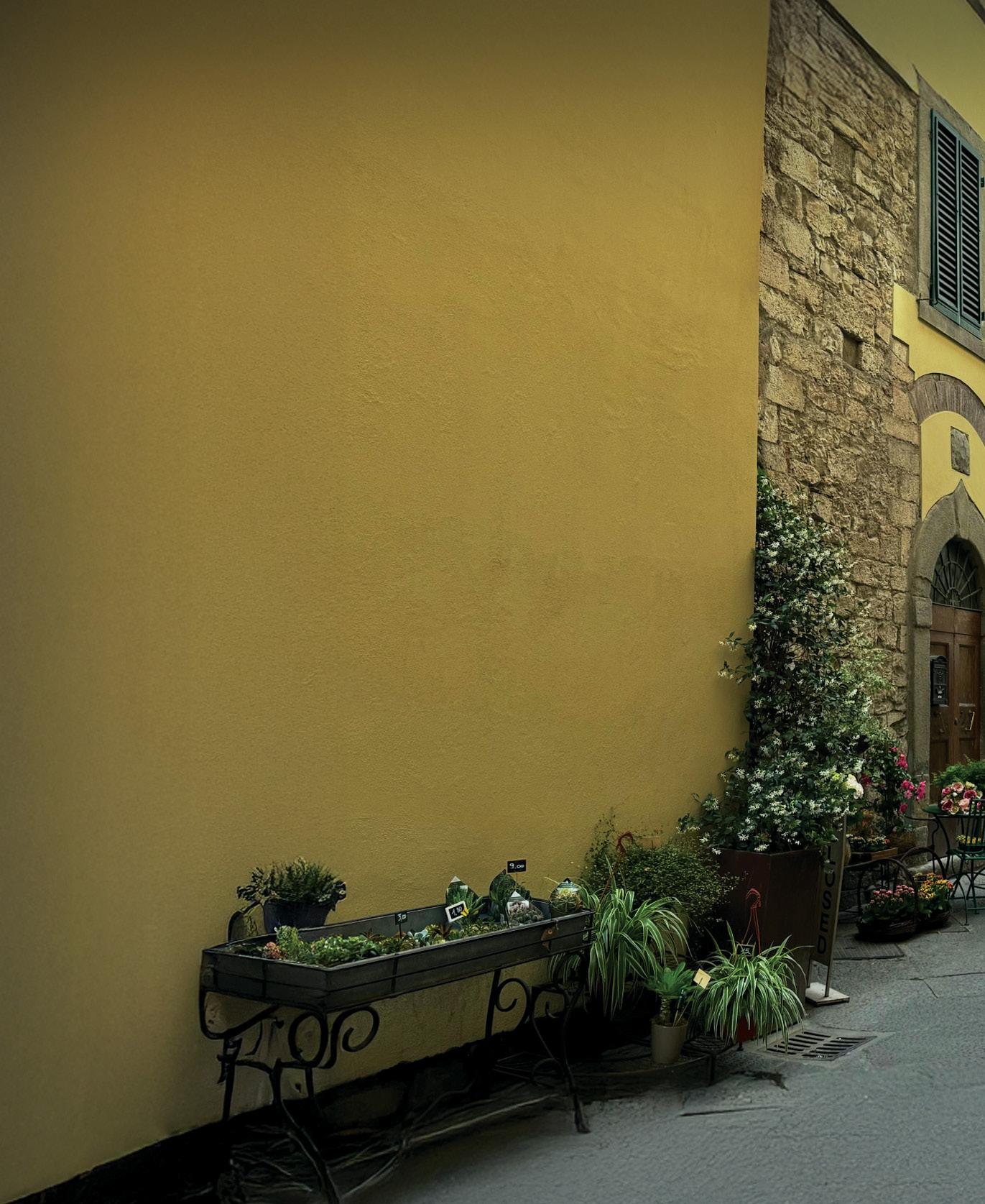

Since opening its first international satellite campus in Prato, Italy, in the fall of 2012, the University of New Haven has offered students an authentic Italian cultural experience in this historic city. The second largest city in the Tuscany region, Prato is just 25 minutes from the arts hub of Florence, one hour from Pisa, and less than two hours from Rome by train. While experiencing life abroad, students have the opportunity to enroll in five classes — including perennial offerings and courses that change each year — taught by both University of New Haven and Italian faculty. While studying in Prato, students learn, explore, taste, and experience something new and exciting each day. Our Tuscany Campus provides a unique environment for intensive study in particular fields and programs, rewarding collaboration between faculty and students, and immersive cultural exploration.

WISH YOU WERE HERE

